






















Lesley Writtle, Deputy Chair
Welcome to the winter issue of Heartbeat.
We hope you’re all settling in the new hospital following our City and Sandwell moves.
This issue also features a goodbye to City Hospital, Ebita winning the last Shiela Lorimer award at City and why Mealtime Matters at MMUH.
Enjoy J
Contact us
Communications Team
Ext 5303
swbh.comms@nhs.net
Communications Department Ground Floor, Trinity House Sandwell Hospital
Published by Communications Team
Sandwell and West Birmingham Hospitals NHS Trust
Designed by
Medical Illustration, Graphics Team
Sandwell and West Birmingham Hospitals NHS Trust
Submit an idea
If you’d like to submit an idea for an article, contact the communications team
Ext 5303
swbh.comms@nhs.net
Stay updated
We send out a Communications Bulletin via email every day and you can now read Heartbeat articles throughout the month on Connect. Don't forget you can follow us on:
It’s with great pleasure I can finally say we are in our new hospital, Midland Met! I would like to say a massive thank you to all the staff who have made this possible as without their continued hard work and commitment, the move from both Sandwell and City would not have been possible. Within my message I wanted to acknowledge and recognise the impact and ongoing delivery and support by our many Community and Primary Care Teams who have worked tirelessly to enable the safe implementation of MMUH by ensuring our patients are cared for within the community and closer to home. We also want to recognise the unsung heroes of our workforce who are working behind the scenes connecting our patients and maintaining care in the community along with partners. The delivery of the new hospital wouldn’t have been possible without the continued support of the community and primary care teams all our support services and numerous contractors. Despite moving into a new hospital rules remain the same at SWB and we still have a zero-tolerance policy towards racism and abuse of any of our colleagues or patients. We want to support our colleagues in any way we can and will not tolerate, under any circumstances any of our staff being subjected to intimidation, harassment, or racist abuse.
During the month of October, the Black Country hosted its very first Speak Up Conference as part of Freedom to Speak Up strategy. Staff from across our local Black Country Integrated Care System were invited to attend this key event, making our commitment to listen to staff at the forefront of what we do. This is something

I feel very passionately about, but it is really important that we do something about the issues you raise with us to improve working lives and wellbeing. Please do speak with your Speak up Champions or our NonExecutive Director lead, Val Taylor.
With all the work around MMUH I must also remind staff of the importance of taking annual leave. We are incredibly thankful of the commitment you made to get our new hospital open but Annual leave is essential for your wellbeing, allowing you to rest, recharge, and maintain a healthy work-life balance. As a Trust, we strongly encourage you to plan ahead and make full use of your annual leave each year. As we get closer to March, managers and colleagues are reminded to proactively manage and allocate any remaining annual leave as soon as possible.
Learning and development at SWB is vital to improve as an organisation. We all have preferences when it comes to learning skills. There are many opportunities across the Trust to support this. This could be from personal reflection, weLearn activities, conversations with colleagues and peers, attending a course or webinar, projects, self-directed learning, shadowing others or having a coach or mentor. Your Performance Development Review (PDR) is a perfect opportunity to explore this further and agree a plan for 2025 and beyond.
My final plea to all staff is if you haven’t done so already, please get your Flu and COVID-19 vaccinations. Every year, rates of respiratory conditions such as flu increase across the winter season, putting people across our communities at risk. To protect yourself, your loved ones and our patients please consider getting immunised.

With us moving much of acute hospital care to MMUH, we have bid farewell to many parts of City Hospital as we know it.
In the late 19th century, the foundations of an infirmary for the Birmingham Union Workhouse were laid, and, in 1889, City Hospital officially opened its doors. Designed by W.H. Ward, the infirmary adopted the revolutionary principles championed by Florence Nightingale, emphasising the care of non-infectious sick individuals.
A quarter-mile long corridor connected nine pavilions, with open-air bridges allowing air circulation – a progressive approach in its time. Even Queen Victoria recognised the significance of this institution, gifting two volumes of books to launch a hospital library.
Rob Kemp, Decommissioning Team Leader has played a huge role in helping to wind down the City Hospital site as part of our retained estate plans.
Rob explained: “We had been clearing out buildings for quite a while from nuclear medicine, Arden House, the Anne Gibson rooms, Ascot House and the poisons unit, to name but a few places.
“Decommissioning is not all about finding memorabilia and clearing out areas. It’s essential to safely close parts of our sites so that we can reconfigure them to fit in with
our retained estate plans. When asked what the best three items the team have saved to help preserve the history of City Hospital, Rob beamed: “It has to be a weighing chair from the early 1930s, the bells that are from the workhouse and the chair from there dated 1850.”
He added: “The buildings have fulfilled their purpose since 1850. It was an honour to assist the Trust in beginning a new chapter in its history with the closing of City Hospital and the opening of Midland Met. It will ensure that people now and, in the future, have access to the best medical care available in their area, and I am proud to have played my part.”
Dermot Reilly, ED Sister has worked at SWB over 30 years and has fond memories of City.
Reflecting on these past four decades in emergency nursing, Dermot reminisces: “I sometimes feel like I’m telling tales from another era when I talk to our younger staff. Healthcare has evolved so much that describing our practices from the 1990s sounds like something out of a history book. But while tools and techniques have transformed, what hasn’t changed is the people and the way we care for our patients.
“I’ve witnessed so many moments, that it would be hard to put into print just one. There have been lots of good times and some bad times, some memorable patients along
the way who you never forget. But without a doubt there have been some hilarious times with lots of laughter that are hard to capture in words. It is why I love emergency care – it is a career I have never regretted.”
City Hospital’s legacy won’t be forgotten. The site’s history will live on in the proposed ‘City Hospital West’ development. Homes England plans to transform the land we vacate into a vibrant community featuring up to 750 high-quality homes, retaining the iconic Infirmary Front Range building for conversion into apartments. The plans ensure the new community development integrates with the Trust’s retained estate, creating a harmonious balance between the new neighbourhood and ongoing healthcare uses.
The enduring dedication and the unwavering commitment to healthcare will form the foundation on which our future at Midland Metropolitan University Hospital will be built on.
The legacy lives on, and the best is yet to come.
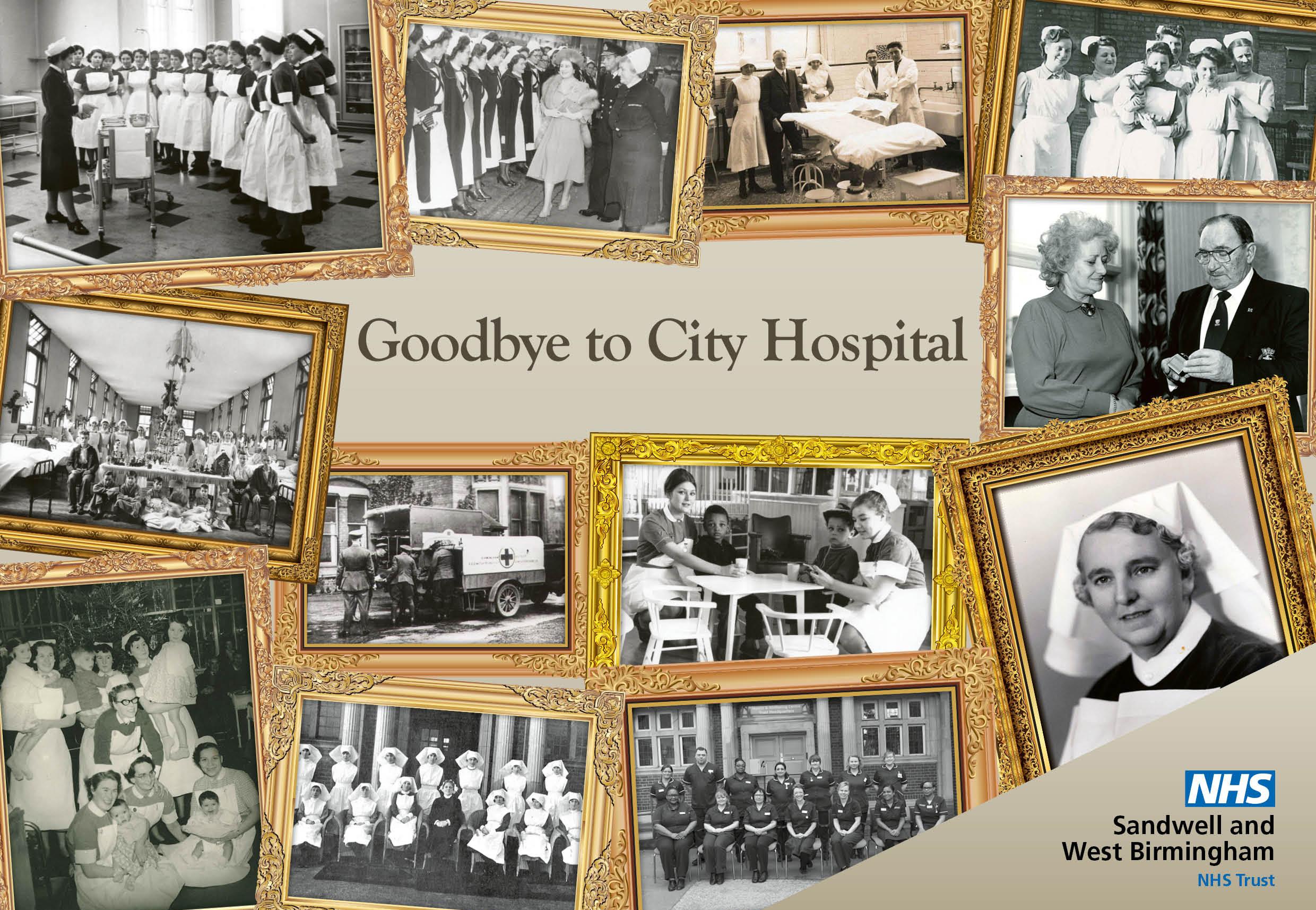
The Research and Development team invited patients to an event to celebrate the vitally important role they have played in trials over the past year.
Kelly Hard, Head of Research and Development at the Trust, explained: “In 2023/24 we recruited over 2,500 participants for our research studies.
“Around 20 patients from studies in our most active areas attended.
“These included cardiology (the study and treatment of conditions of the heart and blood vessels) and haematology (the study and treatment of blood disorders) were in attendance.
“It was delightful because there was a mixture of research staff, clinicians and participants. Chairman Sir David Nicholson discussed the significance of medical research, as well as highlighting
that this was the first event of this kind that he had been aware of.
“This was followed by Professor Hughes who discussed her own experiences of research over the years. She also explained the importance of trials, and how they have impacted her practice. For example, in her area of haematology, many patients took part in studies which are now routine practice. Professor Derek Connolly then did the same for cardiology.”
As a token of appreciation, the patients were given a goody bag and provided with drinks and cakes at the event.
Kelly added: “We wanted to reward them as these participants make an important contribution to overall hospital care. It is well documented that organisations which participate in research have better outcomes for all patients. It attracts and retains more experienced and skilled staff, and mortality rates are lower.
“For many of our patients, research is the only way to access treatments and so should be offered as part of routine. It is important
not only for those experiencing illnesses or diseases, but also looking at future treatments, preventions and services.”
The research team also received glowing feedback from those who attended the event. Kelly shared: “Patients explained that they were grateful to be able to participate and enthused about the benefits of taking part not only for them, but for their families, friends, and future generations.
“They mentioned how well they were cared for during their treatment and were glad that they could do something in return for all the NHS has offered them. Patients asked for more of these events, as they felt it was helpful to be able to discuss the research they had taken part in and find out what happened as a result of it.”
Kelly shared their sentiment. She said: “I hope we get to do this again in the future as it was a great opportunity to engage with patients and make them aware of the important role they have played. After all, what is research today can become routine practice tomorrow.”

Development
Two of our colleagues, specialising in management of alcohol-related ill health at SWB have been named as visiting professors by a leading university.
Sally Bradberry and Arlene Copland are part of the Alcohol Care Team at the Trust and have been working collaboratively with the Department of Psychology at the University of South Wales (USW) for just over a year.
Sally shared: “We are honoured and excited to have received this title as a reflection of the collaboration between ourselves and colleagues at the University of South Wales. Arlene explained: “The aim of the Alcohol Care Team (ACT), is to improve the care and management of those attending the trust with alcohol related issues. We challenge judgement and stigma towards these individuals by improving the understanding of addiction which is often poorly understood by clinicians. We have gained national recognition as the first ACT to demonstrate the vulnerability of our patient population and the impact
of an ACT within an acute setting, and our data set is now shared with ACTs throughout England, enabling them to better evidence their outcomes.
As a result, Arlene became Lead Alcohol Nurse for NHS England in 2021. She shared: “Sally and I decided to use the money that I brought into the service through this role to employ a researcher who could help us to share our experience and success more widely through publication in the peer-reviewed literature.
“We have been working with research fellow Darren Quelch at the University of South Wales, who we first encountered when he did a project as a Birmingham medical student with Sally a few years ago. He subsequently got in touch with us regarding USW's Dept of psychology's work on alcohol related brain disorders and we were excited to have the opportunity to work with Darren on other alcohol-related projects and maintain this connection.”
Sally highly commends all research staff at the University of South Wales. She added: “Right from the beginning it has been a
pleasure to work with such welcoming and enthusiastic researchers at USW. They have made us feel like part of their team even though we don’t have the opportunity to meet with them face to face very often. Our appointments as visiting professors is a generous reflection of the outward looking ethos they have as a department.
Arlene added “It is an immense honour to be named a visiting professor. Most professorships are offered to medics and academics but rarely to nurses. For the expertise of a senior clinical nurse to be recognised in this way is unusual and I feel incredibly proud especially as I work clinically and have not moved into the academic world. This is further recognition of the impact of the SWB Alcohol Care Team who are making a difference to those with alcohol issues both in our local region and beyond.”
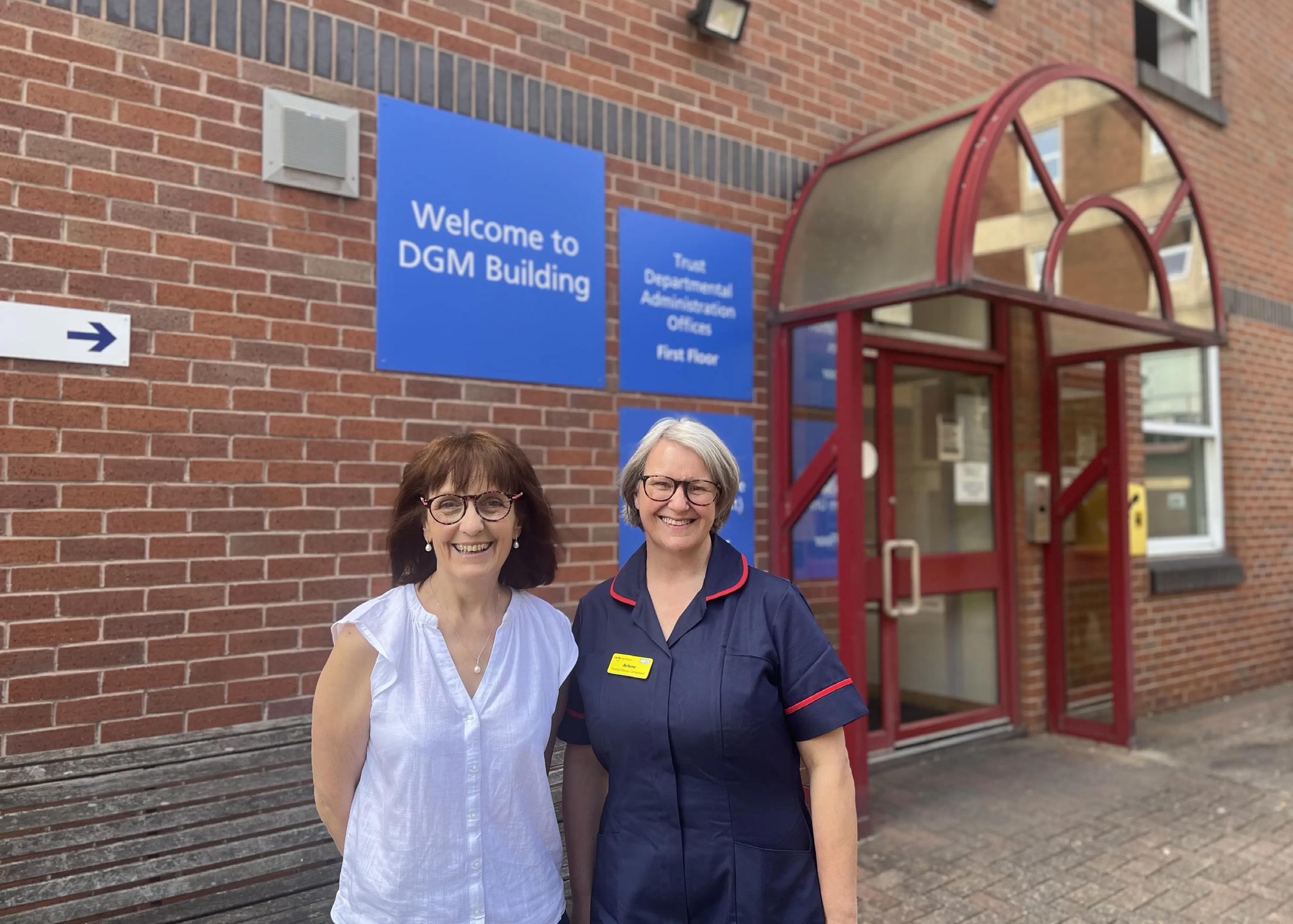
Our patients will receive treatment for skin problems quicker thanks to the launch of a new service across the Black Country.
The new service, which is one of the largest Teledermatology projects in the NHS, has been launched and aims to triage patients within 24 hours, excluding weekends.
Run by clinicians across the Black Country Provider Collaborative (BCPC) – which consists of SWB, The Royal Wolverhampton NHS Trust, Walsall Healthcare NHS Trust, and The Dudley Group NHS Foundation Trust – the new Teledermatology service allows patients to book a consultation through their GP and receive feedback from specialists.
Their GP will take images of skin conditions using dermatoscopes attached to a smartphone or tablet, which will be sent to the dermatology department at their chosen hospital.
A dermatologist then reviews and responds to the GP, within 24 hours, providing guidance on how to care for the patient and whether further investigation or hospital care is needed.
More than 250 GP practices have signed up for the scheme – covering 1.5 million population across Walsall, Wolverhampton, Dudley and Sandwell.
James Halpern, Consultant Dermatologist and Clinical Lead for Skin for the BCPC, said: “Since the pandemic we have seen a large increase in the number of skin cancer referrals.
“The new Teledermatology service allows large numbers of referrals to be triaged more quickly and will help us address the backlog. It will allow a single point of access and quicker care, closer to home.
“Instead of waiting for an appointment after seeing your GP, a treatment decision can be made within 24 hours. This will help with scarce clinic capacity.
“We will be providing training to GPs and they will also be provided with the equipment.
“There will also be a super-user for each
Trust who can add locums onto the system quickly. We also have a 24-7 support hotline to help us with technology.”
Diane Wake, Senior Responsible Officer for the BCPC, said: “This is one of several impressive initiatives that have been cultivated as a result of the collaboration between the four Trusts and I’m delighted we are now able to offer this service to our patients.
“This is tremendous news for dermatology patients in the Black Country and the wider area who will benefit from improved outcomes as a result of this.”
There are currently 3,800 new dermatology referrals every month, with the number of two-week wait appointments having doubled.
By launching Teledermatology services in the Black Country, clinicians hope to reduce unnecessary hospital appointments and speed up access to diagnosis and treatments, including two week wait skin cancer referrals.
There will still be capacity for face-to-face appointments if needed.
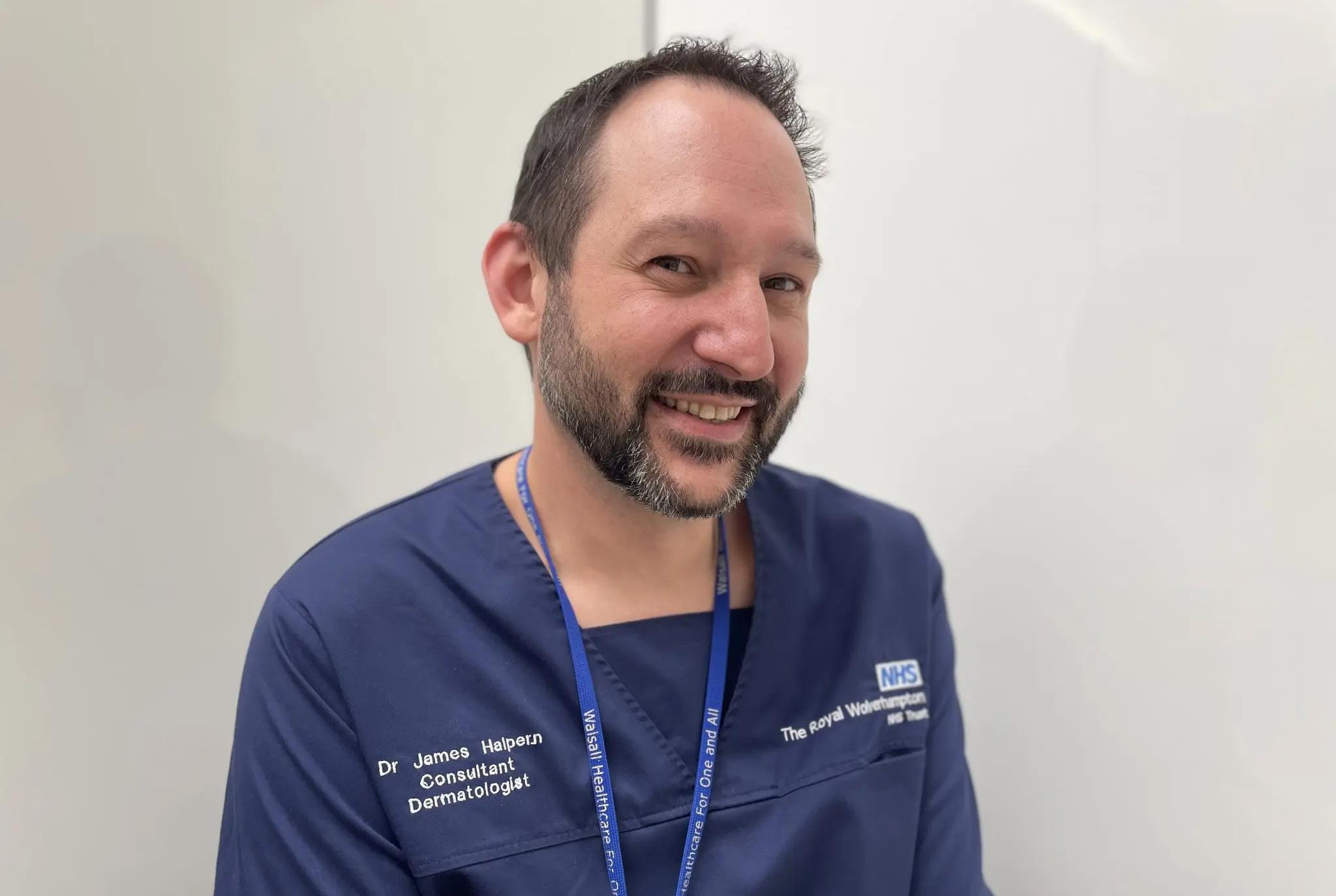
A poignant multi-faith blessing was held at the Midland Metropolitan University Hospital
Spiritual leaders representing the Christian, Hindu, Sikh and Muslim faiths as well as a non-religious humanist conducted the ceremony at a special pre-opening event for MPs, councillors and partner organisations from across the area.
Leading the service, the Rev. Eddie Briones said: “We thank you for entrusting this new hospital into our care. We also take this time pray for the NHS, one of the greatest blessings in this country, we pray for sustainability and stability in the years ahead of us.
“We pray that every corner and space be a symbol of fortitude, healing, protection and blessing to all. We ask that we may be able to exercise our values of ambition, respect and compassion as we build cultures anew.
“May this be a place of peace and healing to those who are ill and a place of hope and comfort for those who struggle in many forms. The Midland Metropolitan
University Hospital is indeed more than a hospital and may the human spirit of sharing and caring shine in this place.”
His prayers were followed by blessings from Hindu Chaplain Rakesh Bhatt who quoted Mahatma Gandhi: “A patient is the most important in our hospital. They are not an interruption to our work. They are the purpose of it.”
Sikh priest Joga Singh added: “In the Sikh tradition, we are taught that Seva or selfless service of humanity is the highest form of service. This hospital stands as a living embodiment of that principle.”
He was followed by Muslim Imam Akm Kamruzzaman who told the audience: “In Arabic, shifa means healing, both physical and spiritual, and it is a gift that only Allah bestows. It represents not just the cure for illness, but also the restoration of balance and well-being in our hearts, bodies, and souls. It is with this understanding that we open this hospital. A place dedicated to the pursuit of shifa, guided by Allah’s will and compassion.”
The blessing concluded with Humanist chaplain Pete Bispham. He said: “Humanists
GENERAL
CORPORATE AND GENERAL
believe in the good within people and that all people are equal. Humanists have respect for all religions. The chaplaincy in this hospital will play a vital role in supporting patients of all faiths and belief systems by giving them spiritual pastoral and religious care according to their needs.”
Sir David Nicholson, Chairman for SWB said: “Our multi-faith blessing is an important part of the process to open the hospital as it connects our communities to the building that will shape their lives for years to come.
“From bringing new life into the world, to caring for those affected by unexpected illness and accidents, faith is the cornerstone that supports many people throughout, and to know their hospital has been blessed in preparation to care for them is a significant reassurance.”

Local MPs, councillors and authority leaders were welcomed to our stateof-the-art Midland Metropolitan University Hospital for a special visit.
They heard how the colourful building will boast 736 beds – half of which are single ensuite rooms – a winter garden, and high spec robot technology.
Welcoming the guests was Sir David Nicholson, Chairman at SWB who said: “Today is a key moment in the Midland Met story. An opportunity for us to show it off to those who helped bring it to


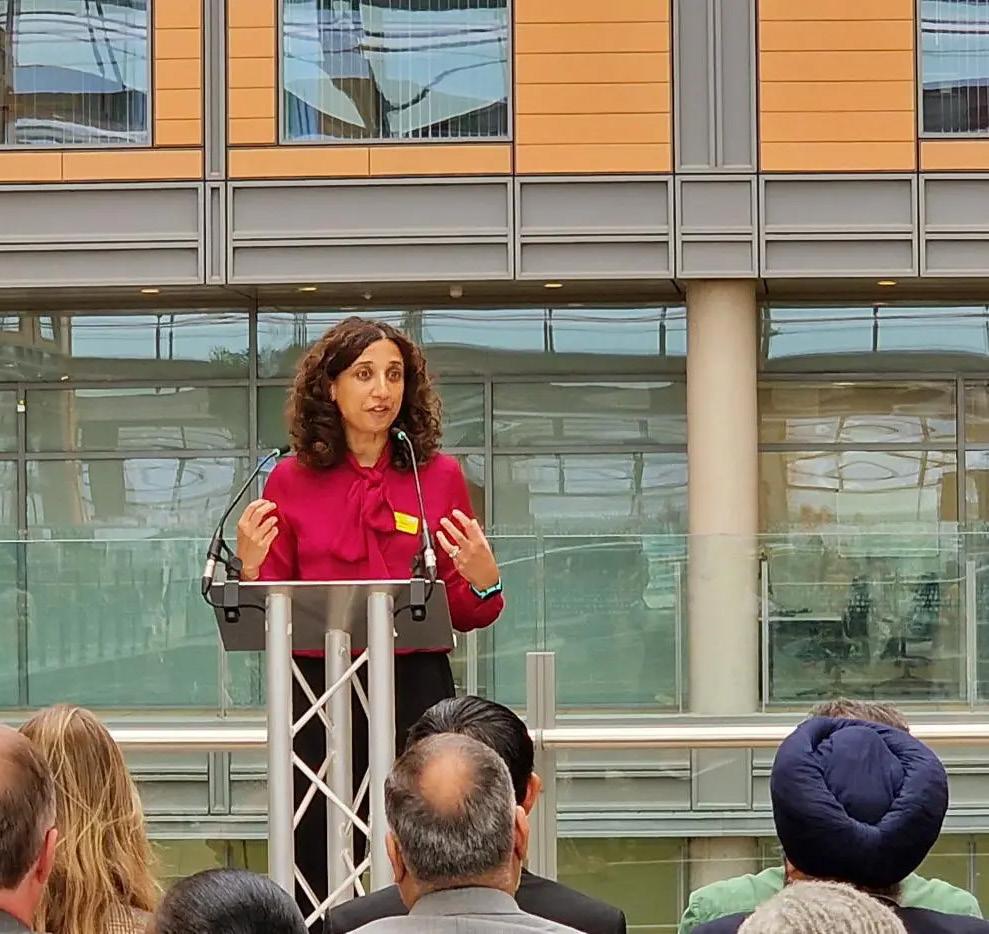
life. Everyone here today deserves thanks for being part of the collaboration that delivered this building.
“Now all we have to do is introduce it to the population we built it for. I have no doubt this hospital and all she stands for will become a landmark across the west of Birmingham, and I greatly look forward to the exciting days ahead.
Guests at the event also heard from Richard Beeken, Chief Executive for the Trust and Rachel Barlow, Managing Director for the Midland Metropolitan University Hospital Programme Company.
They shared more about the hospital’s impact across the community both in terms of redevelopment, regeneration, and
sustainability. Richard commented on the efforts of colleagues across the organisation and those who recognised opportunities to further develop the Midland Met Health Campus, such as building a Learning Campus on site to provide higher and further education, apprenticeships, and work experience opportunities.
Rachel added: “Regeneration in the area will include affordable new homes on the former City Hospital site, and redevelopment of what is known as the Smethwick to Birmingham corridor.
“There will be energy efficient lighting, solar panels and combined heat and power systems – all reducing carbon emissions and energy costs amongst other initiatives.”
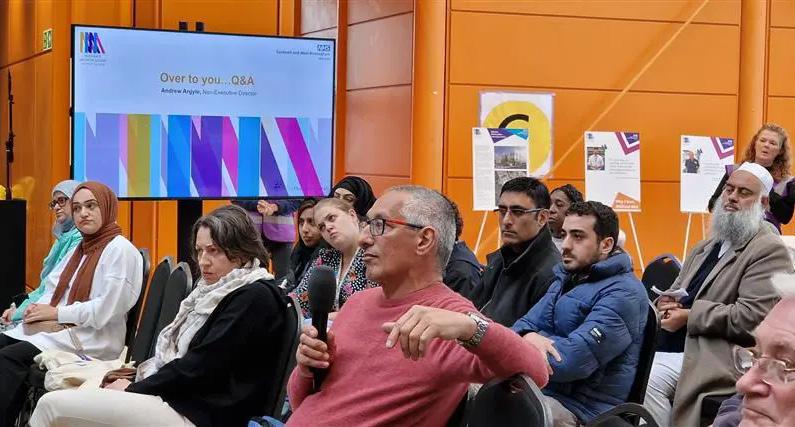
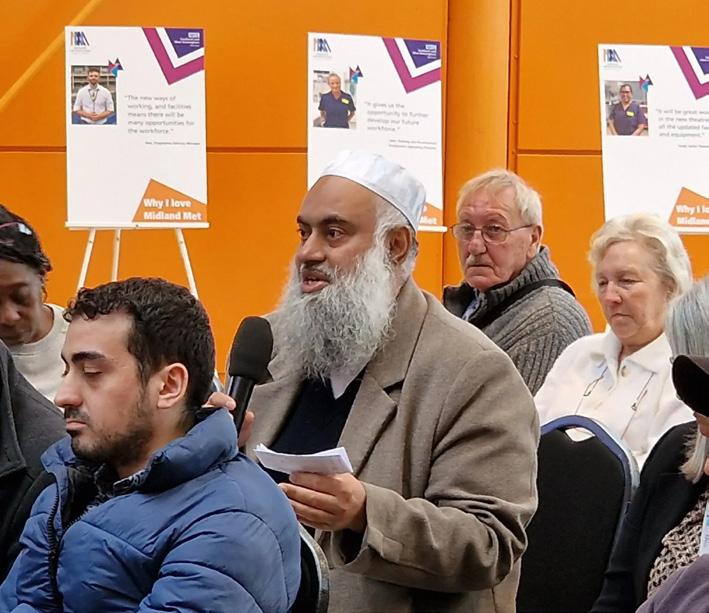
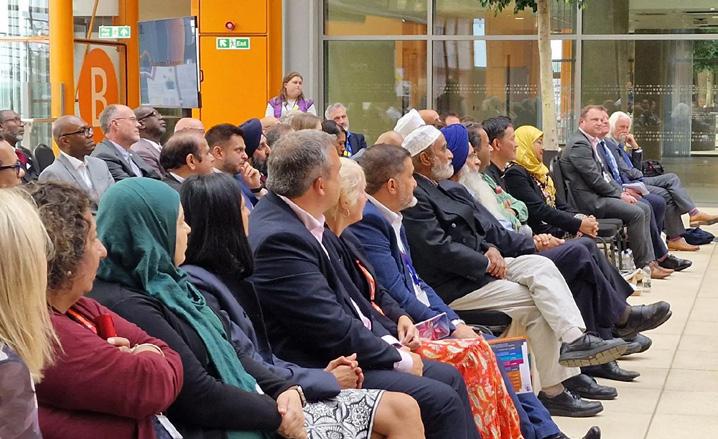
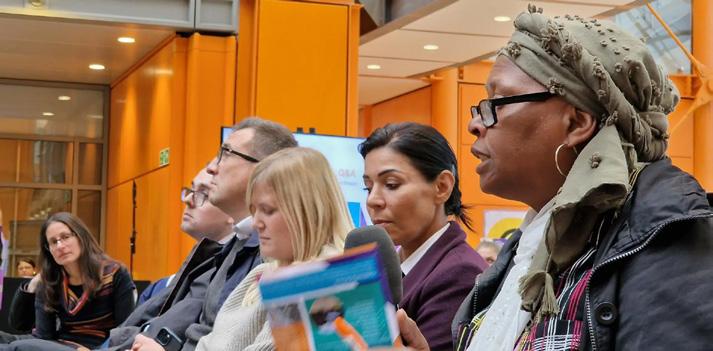
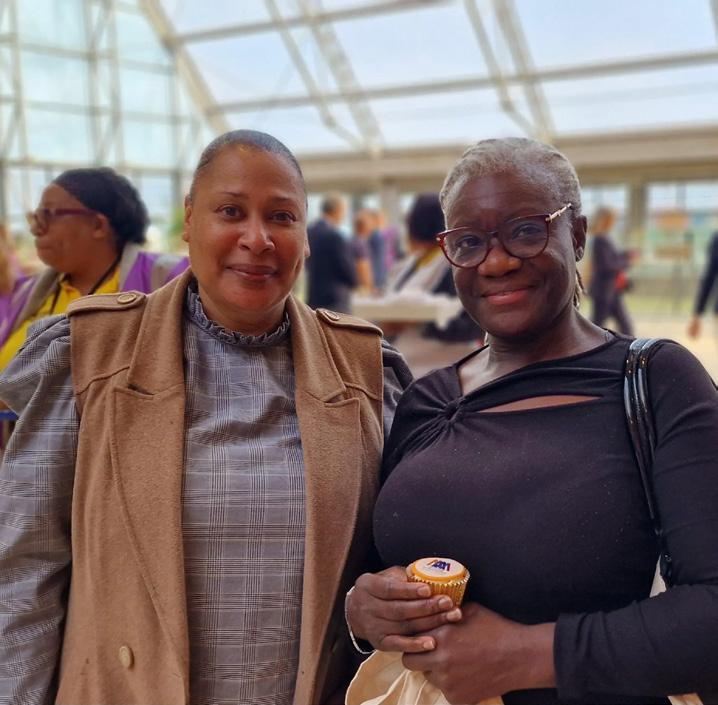
Our Apprenticeship and Widening Participation Team have scooped the Industrialist of the Year award following their efforts in providing work experience placements for local schools and colleges.
Hosted by Sandwell Academy, those in attendance came to recognise the vital role the Trust plays in the partnership between education and industry.
Maxine Griffiths, Widening Participation Manager and Apprenticeship Lead said: “I’m very proud of all the work the team undertakes to enhance knowledge around NHS career opportunities and choices for our local students.
“Having recognition from one of our local schools for this work is truly amazing. We were honoured and delighted to receive the trophy at Sandwell Academy’s
prestigious awards evening for our partnership with them.”
The team have been keen to discuss and encourage a variety of entry routes for all roles, offering apprenticeships from level 2 to 7. As a result, it provides local students with the opportunity to see ‘inside’ the NHS.
Nikki Smith, Work Experience and School Engagement Lead said: “It is a privilege to provide local students with work experience placements at the Trust and hope many of them will become part of our future workforce.”
Karen Whitehouse, Apprenticeship Coordinator added: “As the largest employer in a very diverse area, we have social responsibilities to support our local population, encourage them to join our workforce, support the local economy, and help to raise standards of living.”
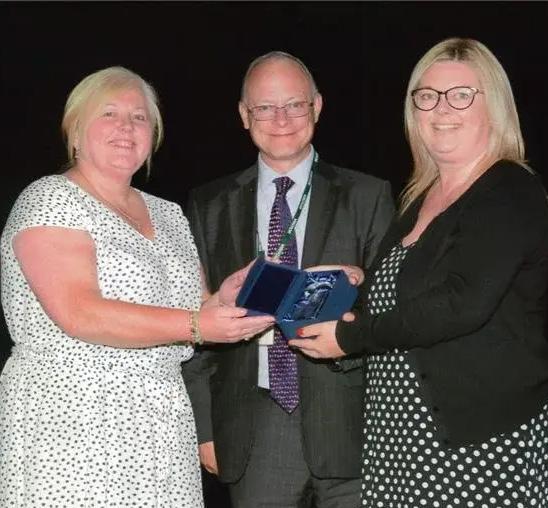
Aaron Bertram-Miller and Jewlee Robinson are celebrating after scooping awards at a prestigious university awards event.
Nurse Associate Educator, Aaron picked up the Embracing Inclusion and Diversity in the Workplace accolade, whilst Jewlee, an Apprentice Midwife, won the Celebrating Apprentice Success gong in the Wolverhampton University Apprenticeship Awards.
The pair attended the ceremony, hosted at the National Brownfield Institute – which was the first of its kind.
Aaron said: “I am overwhelmed and honoured to receive this award. None of this would have been possible without the help of the Nursing and Midwifery Education Team who have helped me on my journey. In my opinion, they are truly the best team in the Trust.”
The judges, made up of senior lecturers and key personnel from the university, added: “Aaron has taken a proactive approach to his learning, shown courage and worked hard. He is also a champion of diversity and always happy to share his journey with other student groups, thereby inspiring and motivating others, particularly those individuals from the Global Majority.”
Lead Nurse in the Education Team, Theresa Morris also commended Aaron. She said: “He has always put others needs before his own and is truly a kind, caring and compassionate individual. He deserves the award as he really goes above and beyond to ensure inclusivity and diversity.”
Meanwhile Jewlee was commended for her dedication.
Senior Lecturer, Olivia Ursell said: “Jewlee has shown evidence of excellent commitment and dedication since the beginning. She was keen to talk to new
apprentices about the programme and offered excellent advice.
“She has also had the honour of representing the University at the National Royal College of Midwives Conference.”
Aaron has already achieved his Nursing Associate Foundation Degree and now continues on the Nursing Degree Apprenticeship route to become a Registered Nurse. Jewlee is set to qualify as a Midwife this September but is already showing enthusiasm for returning to support the next intake of students.

A new Eye Care Liaison Officer (ECLO) has been recruited at the Birmingham and Midland Eye Centre (BMEC) to bolster up support for patients.
Nathan Richards has joined Russell Stephenson who’s worked as an ECLO since January 2020. The new member of the team will carry out various tasks to improve the patient experience and develop new care pathways by collaborating with the emergency department, falls team, stroke service and physiotherapists.
Thuy Pham, Head Orthoptist and Lead for Vision Screening and Community Orthoptic Services, said: “The expansion of our ECLO service is a crucial step
in ensuring that our patients receive the comprehensive support they need. Nathan's addition to the team will allow us to enhance our services and continue to provide highquality care to our community. This decision also reflects the Trust’s commitment to putting the patient at the centre of their eye care and sight loss journey.
Other support from ECLOs include:
• Developing new care pathways for departments with high numbers of visually impaired patients, like elderly care and stroke wards.
• Organising patient information days and condition-specific support groups.
• Improving hospital signage and infrastructure to aid navigation for patients with sight loss.
• Creating materials and tools for ward staff to support visually impaired inpatients.
• Training reception staff and embedding
visual awareness in induction programmes for clinic staff, new nurses, and healthcare assistants. A total of 2,761 patients, carers and families and 399 health care professionals received support, advice and guidance from BMEC’s ECLO service between April 2023 and March 2024.
This represents a 51 per cent increase from the previous year and is nearly five times the national average benchmarked by RNIB.
Additionally, the service also processed 290 Certificates of Vision Impairment (CVIs) in 2023-24, the highest in the West Midlands region, and three times the national average for a full-time RNIB ECLO.
RNIB's continued involvement ensures compliance with the ECLO Quality Framework, endorsed by the UK Ophthalmology Alliance and the Royal College of Ophthalmologists. This support guarantees ongoing training, peer support, and clinical supervision for the ECLOs.
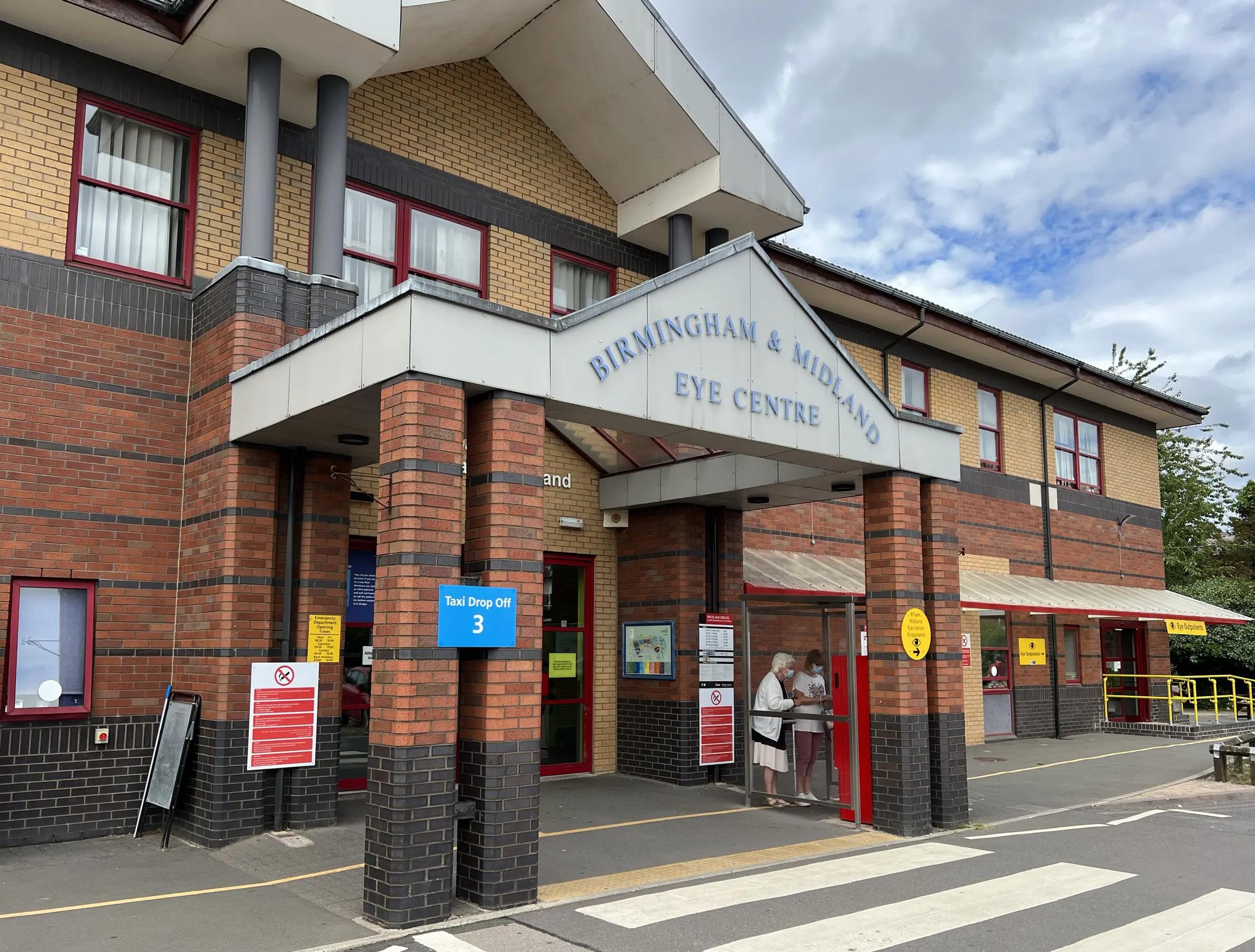
Here at SWB, we are delivering innovative solutions to help provide the best possible care for our cardiac patients.
This is through the role of Cardio-metabolic Secondary Prevention Multi-Disciplinary Team meetings (MDTs).
These are weekly clinical forums, led by Consultant Cardiologist Professor Derek Connolly, that bring together cardiac rehabilitation nurses to discuss and improve patient treatment plans.
The Cardio-metabolic Secondary Prevention MDTs primarily aim to ensure that patient treatment is fully optimised according to the discharge plan and the latest national and international recommendations. These weekly forums address ongoing symptoms, manage complex cases that require consultant input, and ensure swift reporting of cardiology investigations. This approach provides holistic care for our patients and enables us to handle cardiac risk factors more effectively.
The Cardio-metabolic Secondary Prevention MDTs approach significantly enhances patient care by ensuring that
pharmacological treatments, symptom management, risk factor control, and necessary investigations are all optimised. This proactive approach allows issues to be addressed quickly, which removes the need for additional appointments with a consultant cardiologist. Overall, this helps to improve clinical outcomes, reducing hospital readmissions and lowering morbidity and mortality rates.
For our staff, the MDTs streamline communication and reduce the number of email and Unity queries. Most queries from cardiac rehabilitation nurses are now communicated directly to Professor Connolly during these meetings, freeing up valuable time for both specialists and consultant cardiologists. This efficiency allows our team to focus more on patient care and less on administrative tasks.
Professor Derek Connolly, Consultant Cardiologist, said: “The Cardio-metabolic Secondary Prevention MDTs are a vital part of our strategy to provide top-tier cardiac care. By working closely with our rehabilitation specialists, we can ensure that our patients receive the most effective treatments and support.
Looking ahead, we are proud to announce that an initial audit of our Cardio-metabolic Secondary Prevention MDTs was showcased as an oral presentation at the Annual Conference of the British Association of Cardiovascular Prevention and Rehabilitation in October 2024.”
Our Trust is one of the few centres in the UK running such clinics, and we are leading the way in secondary prevention within cardiology. Under the guidance of Professor Connolly, our cardiac rehabilitation team is dedicated to delivering comprehensive interventions that improve patient outcomes.
These MDTs have transformed how we manage our cardiac patients. The collaborative approach not only benefits our patients but also enhances our team’s efficiency and effectiveness. Initiatives like these help us to continue to lead in delivering exceptional cardiac care to our community.
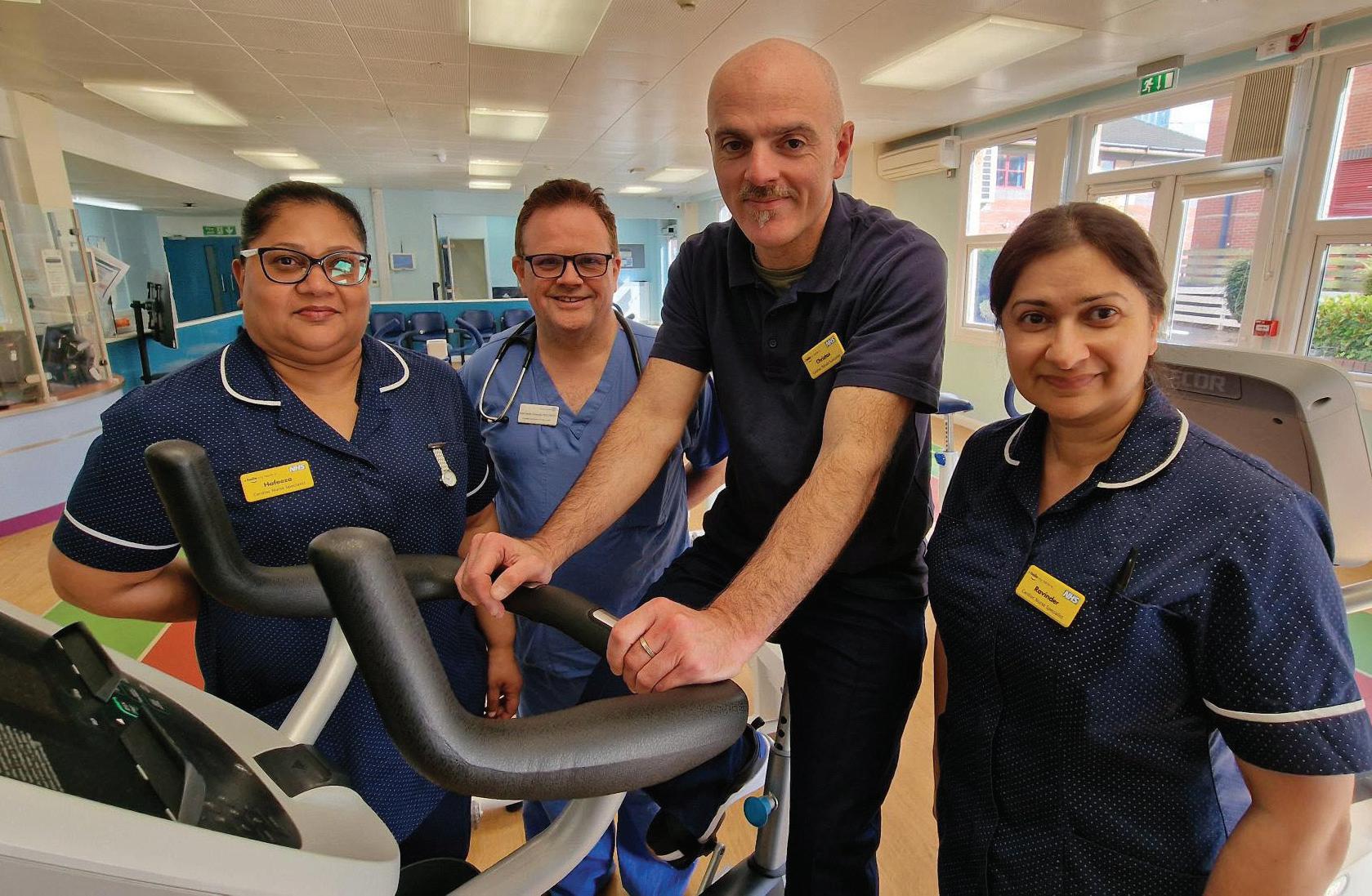
Justine Irish, Deputy Group Director of Nursing is a well-known and prominent figure across SWB but what you may not know is that sadly, her sister Georgina Small passed away earlier this year in our care.
Unfortunately, 47-year-old Geogina had Crohn’s disease and suffered with an immunosuppressive illness that resulted in pyoderma gangrenosum and she would often need blood, iron transfusions and some hospital admissions for sepsis.
Whilst Georgina wasn’t very well, she was cared for in AMU2 and then later in Critical Care. She also had a great relationship with our district nurses for many years and they positively impacted her life.
“Georgina was cared for in AMU2 for a few days where staff were amazing, however her condition later deteriorated so much she was transferred Critical Care where she sadly passed away,” said Justine.
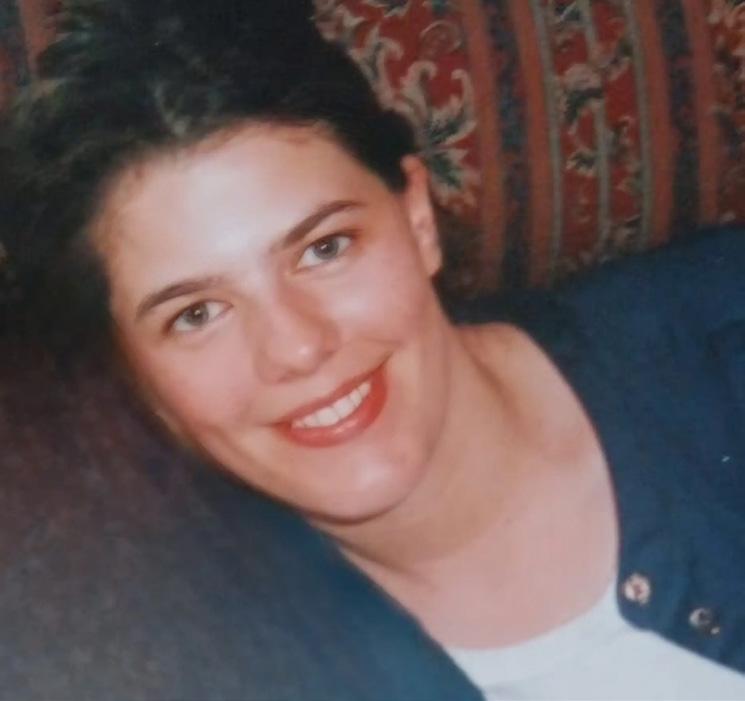
“In the time she was in SWB’s care me and my family saw compassionate care that went above anything we had witnessed. Little things like bending down and talking into Georgina's ear even though she was unconscious. They recognised that she may have been able to hear what was going on around her and they treated her as though she were participating in her care. The way they touched Georgina is probably had the biggest impact on me personally. They held her hand and touched her face with such kindness, like we did as her family and the team explained everything to her and us as a family.”
“Obviously the unit work on a ratio that is different to the wards, but you don’t need a ratio of 1:1 to show compassion. We felt heard and understood and the nurses and doctors were outstanding with communication too. We were fully involved in all decisions yet were confident in their guidance and recommendations regarding Georgina's care.”
To say thank you to Critical Care, Justine and her family decided to fundraise for the department and raised a massive £2,865.94!
“We were overwhelmed by the donations we got in honour of my sister but at the same time happy as we know it was going to Critical Care.”
Justine added: "Georgina was the most giving person you would ever meet. She wanted to be a nurse growing up and we went to college together with the intention of training together however, she became unwell so postponed her plans to train and unfortunately her illness over the years meant that she would not pursue that dream.”
SWB would like to say a huge thank you to all the staff who helped care for Georgina and make her patient experience the best it could be.
Ebita Karki, Staff Nurse on AMU at City has been recognised for her nursing clinical excellence by winning the 2024 Shiela Lorimer award.
This was the last time the award was presented at City as AMU has now moved to our new hospital, Midland Met.
Though initially surprised to win the award, Ebita was delighted to be given such as prestigious accolade.
She said: “I was so happy to hear my name was announced as the winner of 2024 Shiela Lorimer award especially as I will be the last winner of the award at City Hospital.
“There has been a total of nine winners of the award since 2015, so to be

among such fantastic clinical colleagues means a lot to me.”
The Shiela Lorimer is an annual award is presented to a nurse on the Acute Medical Unit (AMU), in memory of Acute Medicine Nurse Practitioner, Sheila Lorimer who sadly passed away in 2014.
Shiela Lorimer was one of our first Acute Medicine Nurse Practitioners and worked for the Trust for over 20 years. Shiela was a pioneer in her field as she was the first nurse to successfully implement nurse led discharge which has led to advanced nurses discharging patients out of hours on all medical wards which resulted in a vastly improved patient journey and experience.
Claire Obiakor, Senior Sister in Acute Medicine believes Ebita is a perfect representation of the award and everything it stands for.
She said: “Ebita deals with every shift on AMU with an excellent positive attitude whilst demonstrating confidence and more importantly, sound clinical knowledge.
“She is caring and empathetic towards all our patients and her teaching skills are very much appreciated by all the staff on AMU as well as our student nurses.”
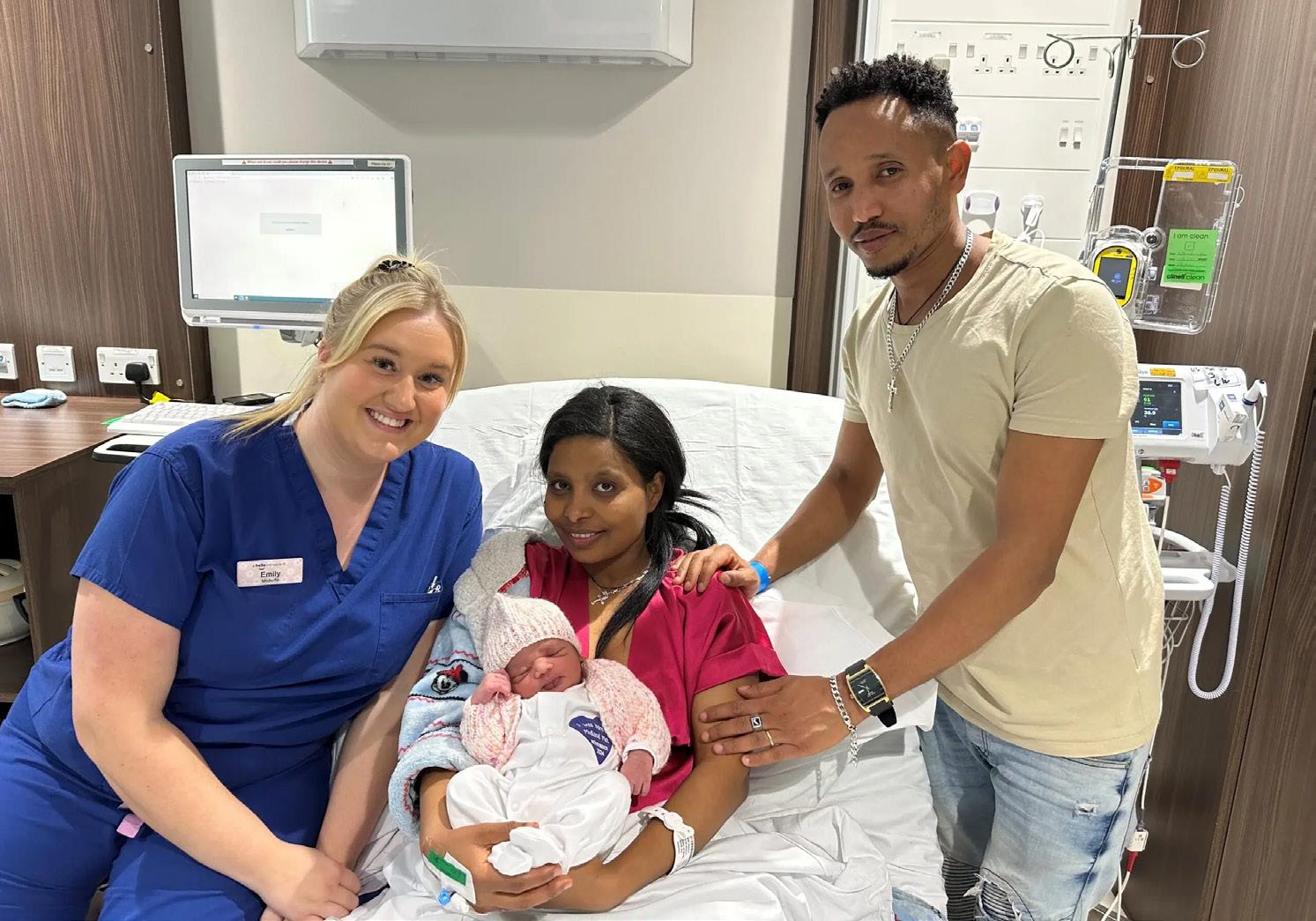
The first baby was born at our Midland Metropolitan University Hospital on Wednesday 6 November.
Mona Lisa Yonas was welcomed into the world at exactly 8.48am on 6 November when the Maternity Department at City Hospital Birmingham closed and the maternity service moved to the new healthcare facility.
Parents Semhar Tesfu and Yonas Kflu of Perry Barr said: “Today has been emotional. We are very happy our newborn baby girl was born in the new hospital.
“We really appreciate the great job the midwives have done and want to say thank you to everyone who helped to deliver our baby safely.”
Midwife Emily delivered Mona Lisa and said: “It’s been an honour and a privilege to deliver the first baby here this morning at the new Midland Met. This is an exciting day that I will remember for the rest of my career.”
This wasn’t all - there was a special delivery of not one, not two – but three baby girls, when identical triplets arrived into the world.
Tiny Luna, Theia and Nephele were born at the ultra-modern Smethwick hospital just a day after the maternity department moved from City Hospital.
Parents Tessa and Patrick were delighted with their new arrivals, which were delivered by C-section by a team of paediatricians, midwives, neonatal nurses and theatre staff.
Mum Tessa said: “We are overjoyed with the birth of our beautiful baby girls and we can’t wait to get to know them. The care has been outstanding at the hospital and the facilities have made it such a comfortable experience.”
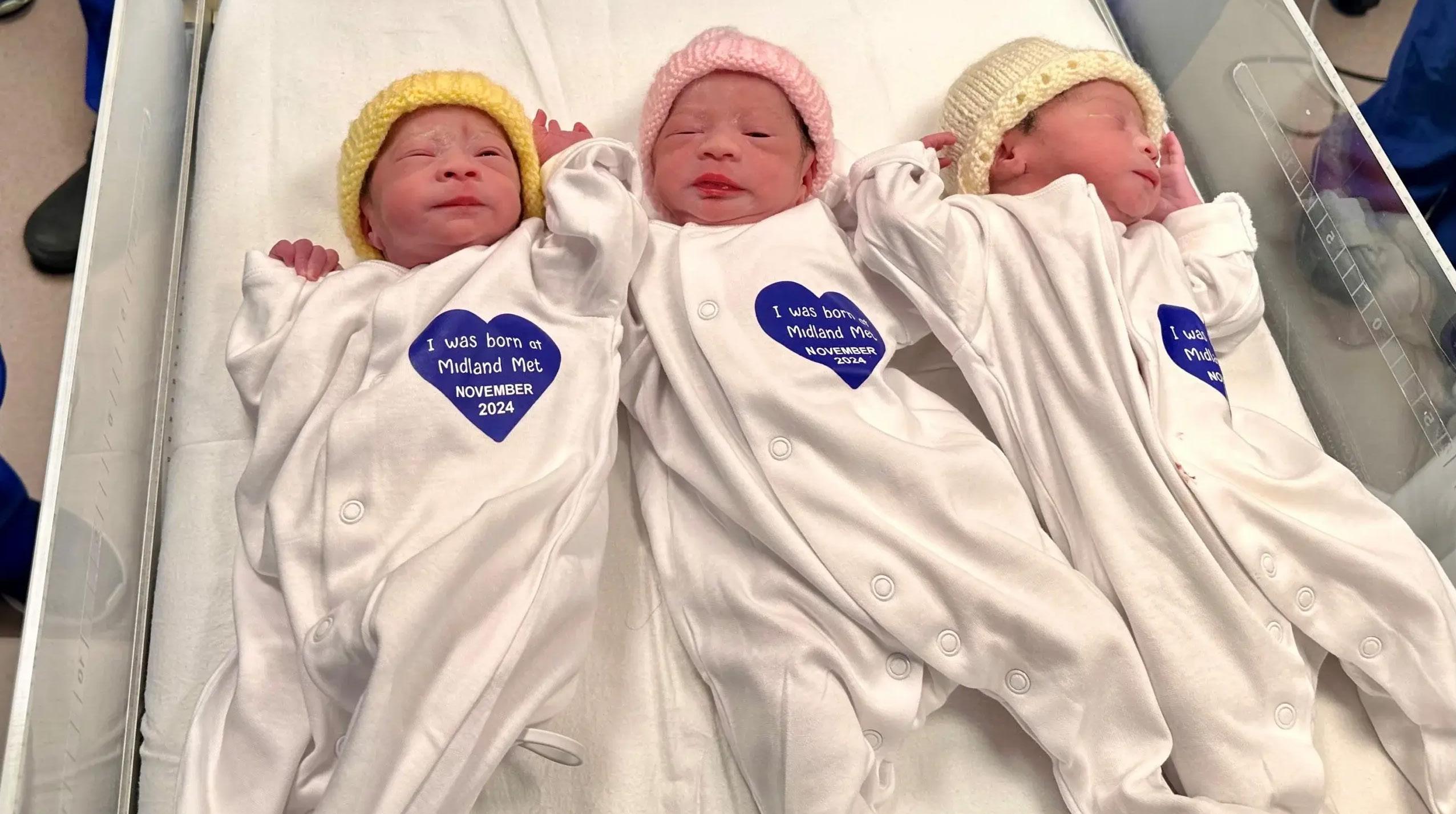
After a decade of planning, we successful moved all our patients to the Midland Metropolitan University Hospital.
The meticulously planned operation was broken into three parts with the first move being our Sandwell patients on Sunday 6 October, followed by our Maternity and Neonatal Unit moves from City on Wednesday 6 November and the remaining City patients on Sunday 10 November.
Sir David Nicholson, Chairman for the Trust, said: “In our three moves, we have safely transferred over 300 patients, from three-hour old babies to a 97-year-old.
All three moves have been very successful
and completed ahead of schedule each time. That is testament to the meticulous planning that has gone into it and we are incredibly proud of all staff involved.
“This achievement is a significant milestone not only for the organisation, but also for the communities we serve, and it is all thanks to the dedication, hard work, and unwavering commitment from our staff that we have made Midland Met a reality.
Richard Beeken, Chief Executive added:
“This was a monumental task – 10 years in the making.
“We have seen incredible collaboration of countless individuals from across all departments, from hospital clinicians to our community teams, admin teams, IT, estates and facilities, cleaning, communications, catering – the list is endless.
“Their professionalism, resilience, and
passion for delivering the very best patient care through our new facilities and new care models, has been second to none.”
The last inpatient to leave was Pankaj Kumar, who is also an A&E doctor at the Trust and is currently being treated for pneumonia.
Staff lined the corridor and clapped as he was taken to the ambulance – and as he arrived into the ward at the Midland Met he was again met with applause.
He said: “It was really a heartfelt moment when I was moved as the last patient. Everyone was standing there, clapping. It was really touching, and then when I got to the Midland Met they were there waiting for me to do the same again.”
Dr Kumar, who has worked at the Trust for 18 years, added: “It was symbolic and emotional.”
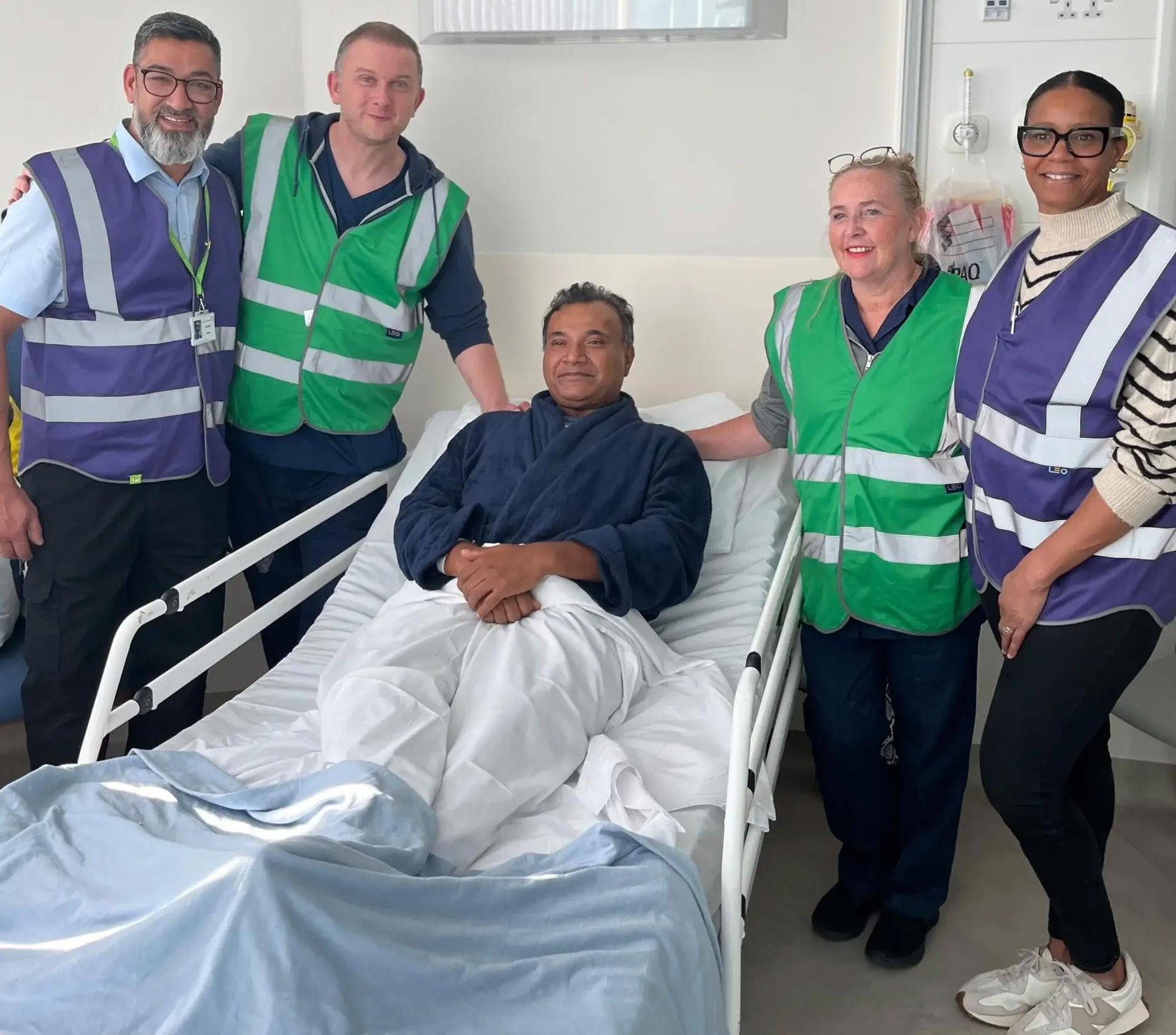
Our Neonatal Unit have been partaking in regular walks to boost their health and wellbeing with it culminatinating in a hike up Snowdon to raising over £1,000!
The team of 12 neonatal staff, led by Balbinder Aujla, Staff Nurse have been taking part in monthly walks to improve their fitness and boost team morale.
“The walks have really allowed us to bond as a team and get us moving which only benefits our health,” said Balbinder.
The walking group has visited an array of locations over the last year including Malvern Hills, Peak District, Sutton Park and Cannock Chase however it recently culminated in a huge ascent up Mount Snowdon – a mountain in the Snowdonia region of North Wales which has an elevation of approximately 1,085 metres above sea level making it both the highest mountain in Wales and the highest in the British Isles south of the Scottish Highlands.
“The group wanted to push themselves so we came up with the idea to hike up Mount Snowdon however, to mark the special occasion we thought we would raise vital funds for the neonatal unit as part of our climb,” said Balbinder.
The Neonatal Unit raised £1,030 and plan to use the funds to improve patient care.
“When we are settled in at our new home at Midland Metropolitan University Hospital, our plan is to use the money for something which will enhance the care and patient journey for babies and their families.”
She added: "I would like to say a massive thank you to all my fellow colleagues who have joined us on our walks throughout the year as well everyone’s friends and family members who donated towards our trek up Mount Snowdon.”

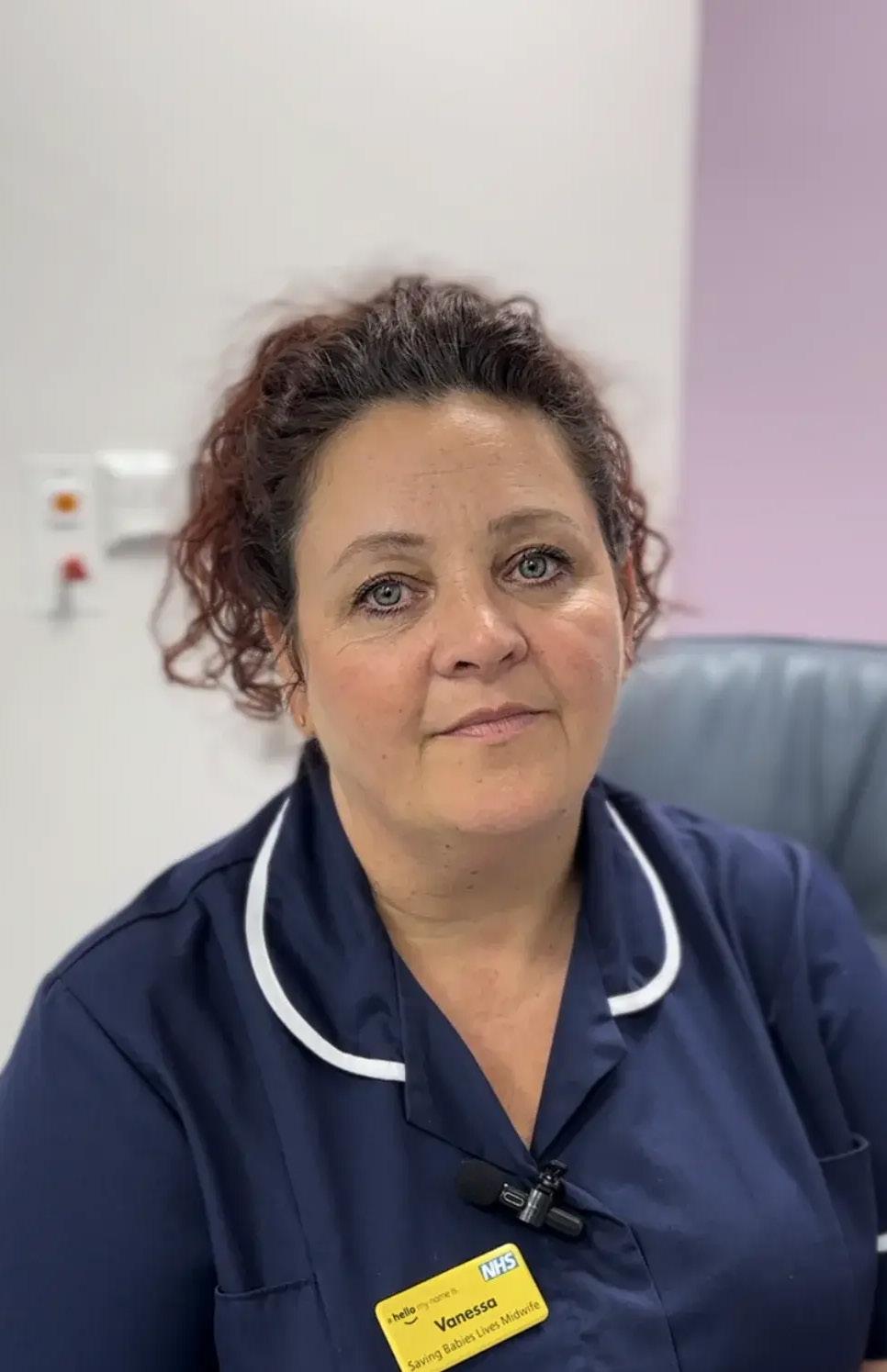
As the Saving Babies’ Lives Lead, Vanessa Neimke provides vital information to parents-to-be which includes the effects of smoking and the importance of feeling the baby kick during pregnancy.
Vanessa explained: “It’s really important that expectant parents are aware of the risks of smoking in pregnancy, what their
baby’s fetal movements mean and how to manage pre-existing diabetes. By stopping smoking, women will reduce the risk of stillbirth or miscarriage and have a healthier pregnancy. Whilst it’s vital that you monitor your baby’s movements from around 16 weeks onwards.
“It is also important to manage babies that are smaller and lighter than they should
be for that stage of pregnancy, monitor babies effectively during labour, and reduce the chance of babies being born before 37 weeks of pregnancy are completed.
“I work closely with different teams to implement and monitor these six elements, known as the Saving Babies’ Lives Care Bundle – which is a document for reducing stillbirth that was launched in 2016.”
Vanessa added: “I have worked at the Trust for almost 13 years, starting as a newly qualified midwife in 2012. I worked on the labour ward for a while but settled in the community for the next seven years. I enjoyed working with people throughout their pregnancy journeys, meeting and supporting their growing families in the time after having a baby. I felt like part of the community.”
In 2019, Vanessa took an opportunity to become the newborn screening lead at the Trust. She explained: “I set up the service, managed a small team and implemented new IT systems, improvements, procedures, and adapted the service to new national guidance.
“I then moved to the risk and governance side of maternity and eventually became the Saving Babies’ Lives Midwife. I feel like I thrive best when finding ways to improve services.
“I decided to go into my field of work as I wanted to help reduce the number of stillbirths and deaths under seven days of age within the Trust. I am dedicated to the people we serve and passionate about training and educating staff to deliver the best possible level of care. I am proud to be involved with improving outcomes for our diverse population.”
Not only this, but Vanessa’s contribution to the Trust extends beyond her role in delivering the Saving Babies’ Lives Care Bundle. She added: “I also educate staff on monthly mandatory training days, update progress on quality improvement, am involved with stakeholders.”
“Recently I have even made some educational TikToks with the help of the Communications Team, to help target a wider audience. One video about the dangers of smoking during pregnancy, received 18,700 views.”
Harbans Kaur has become the first patient to be operated on at Midland Met.
She underwent hip surgery at the Midland Metropolitan University Hospital on Sunday 6 October which is the same day we opened.
She said: “I’ve seen them building the hospital over the years so to be the first person to have an operation is a proud moment.”
Mrs Kaur, aged 78, suffered a fracture at home and was taken to Sandwell.
She was then transferred to the Midland Met on the morning of Sunday 6 October in a meticulously planned process by the Trust.
Around 175 patients were moved from Sandwell Hospital through the morning and into the early afternoon.
“It was originally planned to have the operation at Sandwell but then they brought me here,” Mrs Kaur added.
“I didn’t know that I would end up having the operation at the new hospital, but it’s a real privilege to be the first person to have surgery. The ward is very nice and spacious.”
Daughter Charanjit Kaur, visited her mum on Monday morning. “It’s reassuring to know that my mum had her operation in the new hospital which has all these new facilities.
“It was unexpected and of course it’s never nice to be in hospital. But at least she is being cared for in an improved environment. The new hospital is very nice.”
Mr Saad Elashry, who carried out the operation, said: “The operation went very well and was completed safely.
“We try and prioritise patients who’ve come in with this type of fracture which is treated by replacing the hip.
“Being able to do this in the Midland Met means a better patient journey as the facilities are closer together.”
He added: “It was a great feeling to know that myself and the team were the first to be operating in the new hospital.”
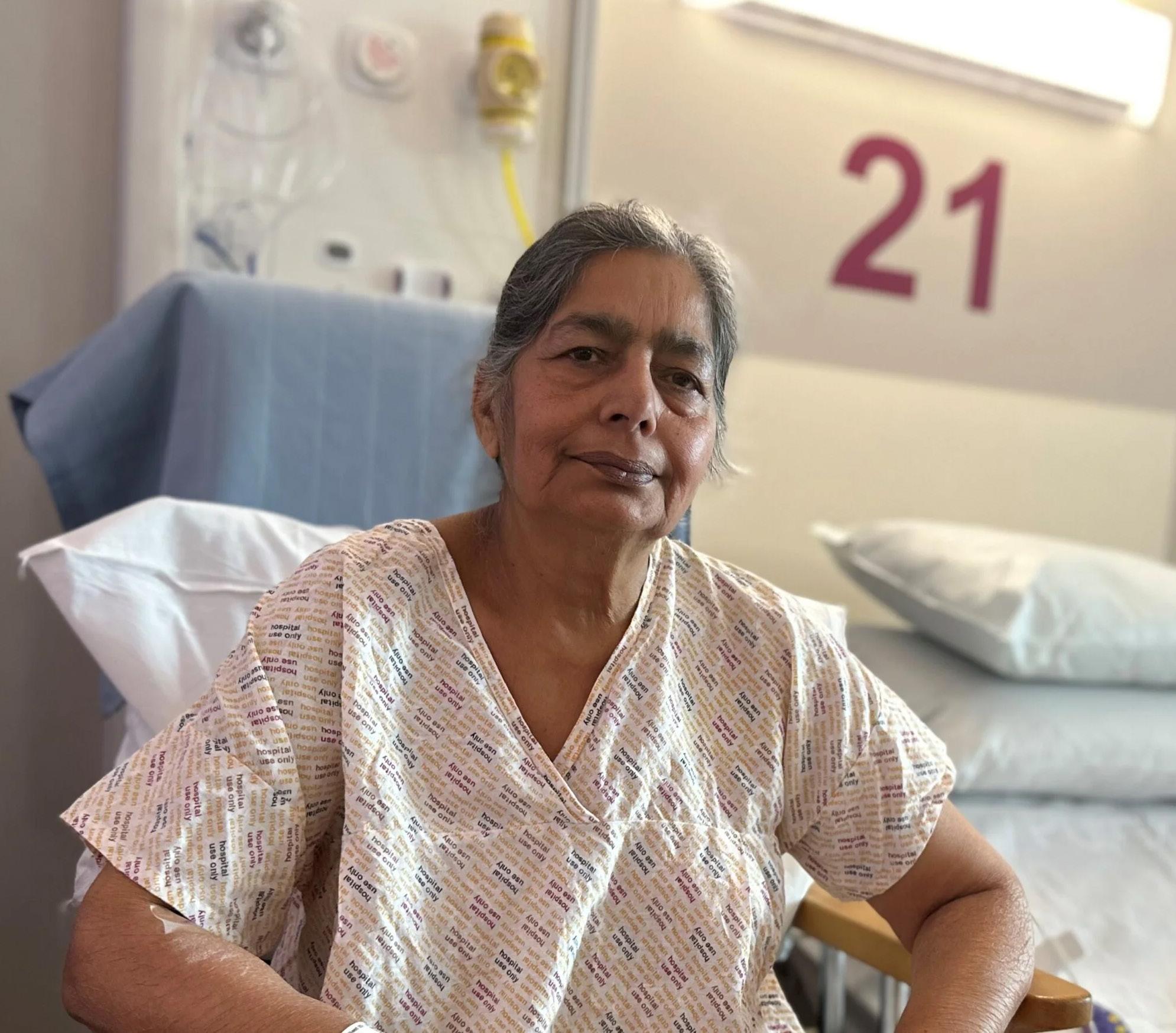
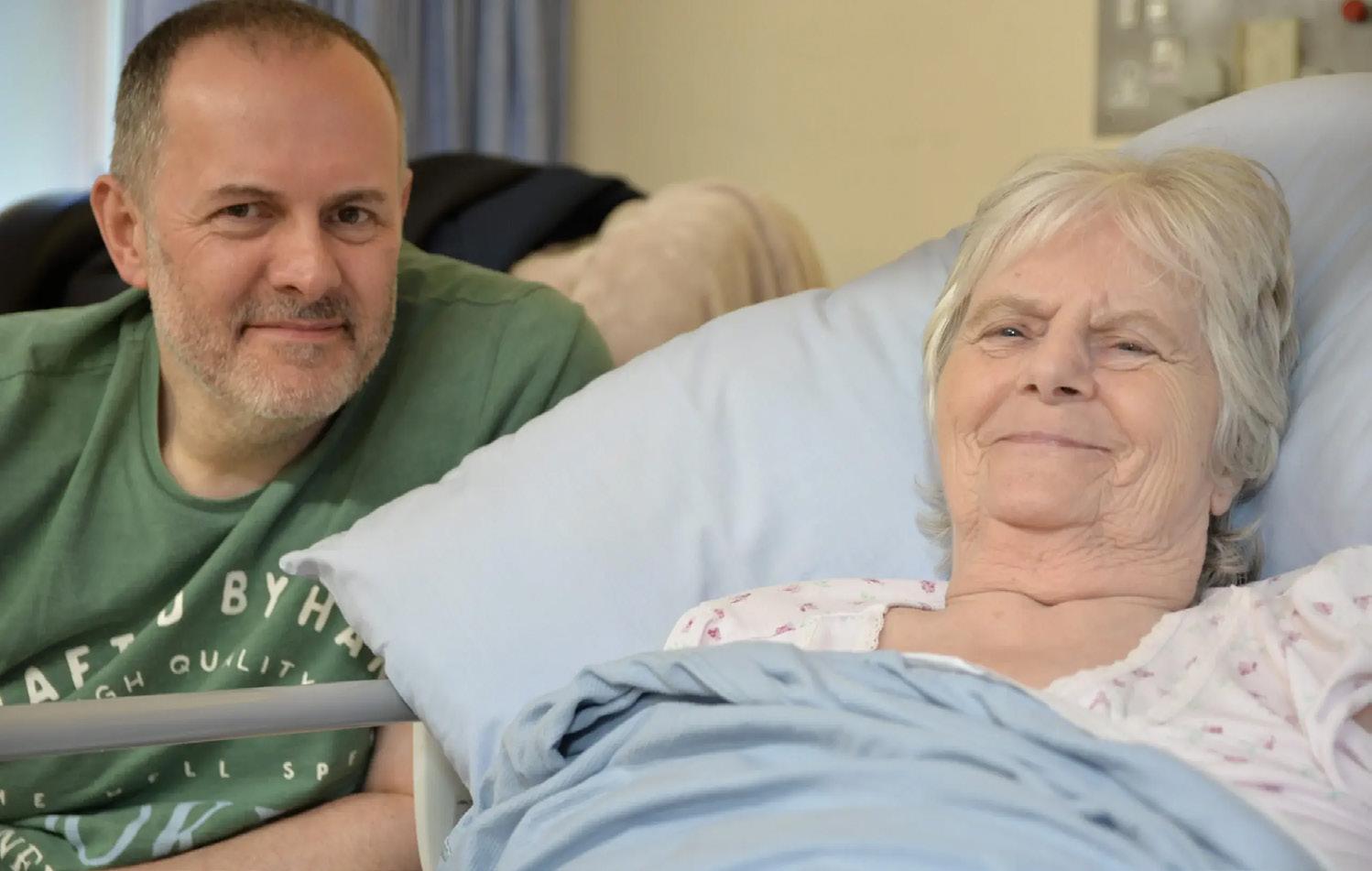
Stroke services have been transformed at the Trust with opening of MMUH
Specialised inpatient rehabilitation care is being delivered into the heart of the community at Rowley, with Beryl Bennett (pictured above with her son Lee) being one of the first patients.
Those stable enough to leave the hospital, will be offered care at home. The service is provided by the Integrated Community Stroke Service (ICSS) at the Trust and it will reduce hospital stays, freeing up beds and
streamlining the patient journey.
Meanwhile at MMUH there will be the new hub for seriously ill patients and initial rehabilitation. This cutting-edge facility will host specialist teams and stateof-the-art diagnostics, ensuring swift, effective treatment.
Clair Finnemore, Stroke Therapy Lead, said: “There are many benefits of moving rehabilitation to Rowley.
“By centralising rehabilitation services at the hospital, we provide a larger, more resilient
team of specialists, enhancing care quality and responsiveness. It will mean smoother transitions for patients from hospital back to home-based care and will allow more clinical time to care for patients, whilst also supporting our commitment to greener practices.”
Clair added: “Clinical evidence strongly supports home-based rehabilitation, showing it leads to improved recovery times and better patient experience. This approach is in line with our Trust’s ‘home first’ ethos, enhancing patient choice and fostering a supportive recovery environment.”
The ICSS will provide home-based stroke rehabilitation through a specialist team available seven days a week. This service includes early supported discharge and intensive rehabilitation.
Clair continued: “A dedicated team of consultants and doctors will oversee care at the Midland Metropolitan University Hospital. Upon discharge, patients will transition to their GP for ongoing care, with a six-week review by a specialist hospital consultant. For those in inpatient rehabilitation, seamless care transfer to the medical team at Rowley will be ensured, with regular consultant ward rounds.”
The Speech and Language Therapy team at SWB have received a charity donation that will transform therapy for patients whose speech has been severely after a stroke.
The donation was provided by the Guru Nanak Naam Ladies Jatha, a group of 15 friends who regularly donate to healthcare providers in the region. Their donation of nearly £4,000 will pay for six iPads and fund specialist speech and language therapy (SLT) apps at the Trust.
Michelle Kennedy, Advanced Speech and Language Therapist, spoke about the importance of having increased access to therapy. She said: “To make improvements
in your talking following a stroke, the evidence shows you need roughly four hours of therapy per week.
“If you’re having trouble understanding language post-stroke, you need roughly nine hours of therapy a week. The apps we now have access to present immediate feedback to the patient, providing the feeling of a therapist being by their side.”
The significant donation will help enhance and improve the patient experience.
Michelle added: “As long as the patient is comfortable with a touchscreen – they will find digital therapy an easy method of re-learning.”

patient
It’s an exciting time for us here at SWB with us moving to our new hospital however to ensure our patients get the best care possible, nutrition and hydration are essential.
As part of the move to MMUH, we have recently launched a new rhythm of the day for our ward staff focused around
Providing an environment for patients where they can focus on eating and drinking by minimising unexpected interruptions and asking people who are not directly involved in the patient’s mealtime to leave the clinical area until the end of a mealtime.
Identifying a mealtime co-ordinator to champion the patient mealtime and to prepare the patient area 30 minutes prior to a mealtime. The mealtime co-ordinator should coordinate support prior to mealtimes ensuring clear tables free of clutter and that a bell is rang to alert patient 5 minutes ahead of meal times.
Ward based staff should help to ensure that bed plans are up to date and finalised 30 minutes prior to a meal time, that patients are sat out of bed, or sat upright prior to a meal time and have completed necessary hand hygiene in advance of the meal time.
the provision of drinks, snacks and meals with a new guideline focused on why ‘mealtimes matter’.
“Our new mealtimes matter guideline goes further, building on this work to define the roles and responsibilities of ward-based staff at mealtimes as we seek to develop and usher into the spotlight and to celebrate great meal time care, said: Ben Biffin, Professional Lead of Nutrition and Dietetics.
“Our mealtimes matter guideline was
Patients, who need help (as identified through MUST screening) should be supported by our staff or a visitor. This may be through practical feeding assistance or simply by offering companionship and encouragement. A red tray intervention should be implemented with the individual having allocated staff member time and support.
People should be offered second mealtime portions where hungry and given support and time to finish these and our mealtimes at SWB should in general reflect the positive experience that we ourselves seek to experience at home.
developed with you and our patients. Together we reviewed what we want mealtimes to look, feel and sound like. We shared and celebrated good practice that exist on our wards and how we would like mealtimes to be standardised moving forward to and agree mealtime roles and responsibilities.
“We agreed that the essential elements to deliver a high-quality mealtime are: being prepared, supporting during mealtimes and processes after mealtimes.
Clear documentation should be completed at the bedside accurately capturing quantities of food and drink eaten. Our patients should be provided information on snacks available and an opportunity to feedback on the meal time experience and left with drinks within reach.
Nutrition and hydration is one of our fundamentals of care and in 2025 you will find that your ward based Tendable nutrition and hydration question has been refreshed and simplified to focus on meal times. We thank-you and your colleagues for your continued care and increased vigor in delivering high quality mealtimes.
Measuring 288-feet long, this could be the world’s biggest art gallery!
Situated at our new Midland Metropolitan University Hospital, The People’s Gallery will not only display art, but it will host theatre, dance and musical performances and run workshops for the community.
Patients, visitors and staff will be able to browse artwork in the gallery on the fifth floor in the healthcare facility based in Smethwick when it opens later this year.
And now a cash boost of £100,000, supported using public funding from Arts Council England, will help to fund the design and development of the unique space which will be adapted to showcase the variety of displays planned.
Johnny Shah, Head of Trust Charity the registered charity for the Trust, said: “We’d like to say a huge thank you to Arts Council England in helping us make Midland Met more than a hospital.
“As part of our We Are Metropolitan

campaign, we have been striving to create community spaces within our Trust estate and add value to the care up to 200,000 inpatients each year that Midland Met will receive.
“Our campaign also aims to greatly improve the working environment of our 7,500 staff working at the Trust. Most importantly of all, The People’s Gallery is for our population of Sandwell and West Birmingham.
“Providing them with access to a cultural hub will be of huge benefit to their ongoing health and wellbeing.
“The People’s Gallery would not be possible without the support of our partners, including New Art West Midlands who have advised on the unique design of this space, and local organisations who are part of our Trust’s arts committee. We will invite them to run mini workshops to support the opening period of our new hospital.”
Sandra Taylor, Senior Arts Manager at the Trust, added: “We can now create a flexible gallery space inspired by artist run galleries in Europe. Our mobile wall system will enable easy reconfiguration for different artworks and exhibitions, maximising space and ensuring accessibility for all visitors.
“By embedding The People’s Gallery within Midland Met, we aim to redefine our hospital as vibrant cultural spaces that nurture well-being and community spirit.”
The name for the newly created independent charity for SWB has been unveiled as Your City and Metropolitan Hospitals Charity.
The charity will continue to support MMUH as well as other sites – Sandwell, City, Leasowes and Rowley as well as GP practices and community services.
Your City & Metropolitan Hospitals Charity is also celebrating the successful closure of the £2 million ‘We Are Metropolitan’ fundraising campaign for the Midland Met.
Funding raised will be used to enhance the experience for patients, staff and visitors to the new site. This included a gallery and exhibition space for art programmes and performances by community organisations, sculptures raising awareness around organ donation, a play unit and artwork for the Children’s Department and additional PhD studentships with university partners to help pioneer new treatments for heart disease, leukaemia and ovarian cancer.
Steve Allen, Chair and Trustee for the charity, said: “We are delighted to reveal the new name for the charity, its brand and strategy after more than a year of consultation with our key stakeholders. This included valued conversations with our

Trust staff and volunteers, as well as our grateful supporters, funders and partners. I am honoured to chair this wonderful charity and be part of a board of trustees with boundless enthusiasm and ambition.
“Your City and Metropolitan Hospitals Charity’s vision is improved live chances and better outcomes in our communities and care systems. The successful fundraising for Midland Met, which is now the nearest adult hospital to the centre of Birmingham, has started this very important work and we are so grateful to every supporter who helped us reach our £2 million target in our previous charity form.”
Johnny Shah, Head of Your City &
Metropolitan Hospitals Charity, added:
“Becoming an independent charity for the Trust means we can do even more to enhance the experience of everyone using our hospitals and healthcare services. The work we have funded at Midland Met are great examples of this, but it is important to remember that both Sandwell and Birmingham remain within the top 10 most deprived local authorities in the country.
“There is so much more we need to do to address health inequalities outside of our hospital walls. Your City and Metropolitan Hospitals Charity would like to call on the grateful support of the business sector and our local community, to help us transform lives.”
Patients across Sandwell and West Birmingham are set to benefit from improved diagnostic capabilities with the launch of Midland Metropolitan University Hospital (MMUH)'s state-of-the-art Nuclear Medicine Department.
The new department boasts three Siemens Pro.SPECTA SPECT/CT systems that only came on the market last year, which represent the latest technological advancement in medical imaging. These sophisticated machines can do far more than traditional diagnostic tools - they combine single-photon emission computed tomography with a 32-slice computed tomography to provide deeper and more complete patient insights.
Joseph O'Brien, Consultant Physicist and Head of Nuclear Medicine at MMUH, said: “The new department is the result of close collaboration between the MMUH commissioning team and the Nuclear Medicine team from City Hospital. We are confident that it will not only enhance diagnostic accuracy but also set a new standard in the way we approach nuclear medicine.”
The department is located on the second floor of the Imaging wing, and its design goes far beyond mere technological prowess. With two injection rooms, two clinic/examination rooms, reception, waiting room and a dedicated bed bay area, it has been carefully planned to support patient comfort and care. This is particularly important as nuclear medicine tests can be time-consuming, with some patients requiring all-day care.
The facility can accommodate inpatients from external hospitals, ensuring they receive treatment with a high level of dignity and support.
Some of the innovations patients can look forward to benefiting from include:
• Faster scan times that reduce patient anxiety
• A more open gantry design improving patient comfort
• Quieter operation to support patients with heightened stress
• Specialised equipment for complex diagnostic needs
The Pro.SPECTA systems bring unprecedented diagnostic precision. They enable more accurate localisation of abnormal tissue and improved lesion detection across oncology, cardiology, and neurology. Siemens has gone the extra
mile by providing bespoke lenses tailored specifically to MMUH’s requirements, including specialised equipment for detecting pulmonary embolism and bile acid malabsorption.
The new systems prioritise patient safety and incorporate advanced radiation dose reduction technologies, including a new CT scan filter to remove less useful x-rays and sophisticated reconstruction software that minimises the amount of radioactivity administered during tests.
Beyond imaging, the department includes a dedicated laboratory for non-imaging studies such as GFR and red cell volume measurements. This comprehensive approach improves on the provision that was available at the previous City Hospital facility, where a single SPECT/CT system created significant booking bottlenecks. With three systems now available, MMUH not only eliminates wait times but also provides crucial contingency in case of equipment maintenance.
“This new department is not just about technology," Joseph explained. "Our vision encompasses enhancing experiences for both patients and healthcare professionals while maintaining the highest standards of health and safety compliance.”

Our new Nuclear Medicine department marks a milestone in our commitment to provide the highest level of diagnostic care
Our Sandwell Health Visitors have been jumping for joy after winning the Team of the Year award at the 2024 UniteCPHVA Annual Professional Conference.
The SystmOne super users won the prestigious award for the excellent work they have been delivering in the community including delivery of all the electronic record keeping training to all new starters in the health visiting service and providing updates for existing staff.
In addition to this, the team were recognised for their efficiency and productivity. Previously, the team would have had to call all service users to ask them what school their child will be attending but by becoming super users they were able to send communications out to parents and they were able to respond directly into SystmOne, thus reducing the workload greatly.
Yvonne Copeland, Clinical Lead for Health Visiting was delighted to win the award. She said: “I was elated to hear we had won the award as we always aspire to improve the patient journey and staff experience, so
to get an award for this is fantastic!
“All the team have worked tremendously hard over the last 12 months and to be rewarded in this way makes me feel proud.”
She added: “What makes this award win extra special is the fact that we were competing against all the other Health Visiting teams nationally and were still able to win.”
The event was held at the Birmingham Conference and Events Centre and saw Health
Visitors, School Nurses, Community Nursery Nurses and students all in practice or academia from across the country come together to hear from leading speakers on cutting-edge topics topped off with an awards ceremony.
Congratulations Sandwell Health Visitors!
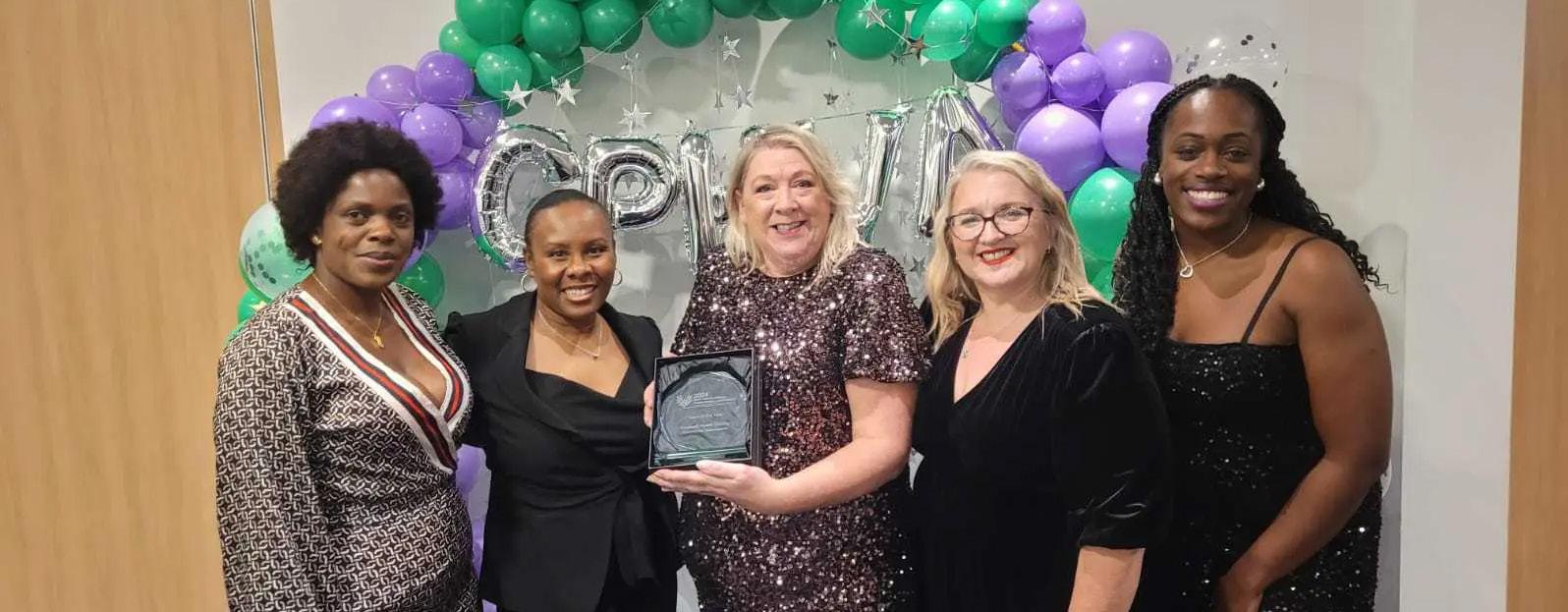
Improved operational oversight: Real-time visibility into absence patterns, allowing for data-driven decisions to mitigate potential impacts on service delivery.
Enhanced resource planning: Dynamic view of staff availability, aiding in workforce planning and ensuring continuity across departments.

Streamlined absence recording: Record and monitor absences quickly, freeing up time and reducing manual input.
Following on from previous staff survey results, directorates have come together to form People Engagement Teams (PETs) which are designed to represent the various departments and their roles inside their group.
Members of the PETs are responsible for agreeing relevant actions to improve staff experience in response to Staff Survey results and meeting regularly to:
• Review progress on implementing actions
• Communicate with teams within the group to ensure awareness of actions being taken and listen to feedback
• Feedback and discuss staff suggestions
• Ensure pulse survey and national staff survey response rates meet Trust targets
• Monitor pulse survey feedback against planned actions and keep plans under review
• Report progress to relevant Trust committees
As a Trust we are always looking to improve our survey results across the directorates and see the results in place, one example of this is from our Medicine and Emergency Care group, who have recently implemented the ‘Happy Mug’ initiative. Happy Mug focuses on providing positivity to colleagues across the group, by encouraging colleagues to share something ‘happy’ whether that’s a fancy new pen or some sweet treats or even a positive message all inside a mug.
If your PET have recently implemented any initiatives or would like to share the amazing work you are doing within your directorates, then we would love to hear from you! Please share any pictures or text by emailing swbh.comms@nhs.net
Colleagues from our iCares Team are working in partnership with the Motor Neurone Disease team from neighbouring Queen Elizabeth Hospital Birmingham to support and care for those who are diagnosed with the disease.
Motor neurone disease (MND) is an uncommon condition that affects the brain and nerves, which can cause weaknesses that worsens over time.
The clinic which runs from Victoria Health Centre in Smethwick was designed to ensure that patients can avoid receiving multiple home visits from a variety of specialists and completing avoiding the need to access any acute hospital.
Since opening in 2023, the clinic has provided care to patients across the area where they can be assessed, treated and referred to another specialist if needed all within one appointment. Patient care is at the heart of what this clinic is all about, across both Trusts, they work seamlessly with colleagues from the QE and local GP practices to ensure that patient records are kept up to date to

Tracey Turnbull, Speech and Language Therapist said: “The clinic is a prime example of how integrated work can help to achieve such a positive outcome for patients living with MND. After a successful first year, we are looking forward to supporting those with the condition in years to come.”
“Working with colleagues from across Birmingham, has given us the opportunity to learn and develop new and current skills, to help transform the care we provide to our patients.”
Furthermore, the clinic has not only helped to minimise the complexity surrounding appointments but has also removed the need for patients to attend an acute hospital setting, which has overall saved several hours of appointment time across both the Queen Elizabeth Hospital and Midland Metropolitan University Hospital.
If you have a patient or know of anyone within the area who is suffering from Motor Neurone Disease, please speak to our iCares team for more information regarding referrals and advice on how to support a loved one with the condition.
Congratulations to Kirk Johnson on winning our recent ARC Star Award. Colleagues across the organisation were nominated for the award, which reflects our Trust Values – Ambition, Respect and Compassion, but it was the Senior Contracts Manager who stood out to the judges.
He was presented with a certificate, badge and a voucher by Lesley Writtle, Deputy Chair who said: “He is a hidden gem –procurement is a very important part of our organisation, and though they aren’t patient-facing, they play an essential part of the patient experience here at the Trust.”
Kirk Johnson, Contracts Manager in the Procurement team, was awarded the ARC Star Award for his ambition and respect towards his colleagues and his work with internal and external stakeholders.
The recipient of the newly established ARC Star Award is someone who consistently
lives our values throughout their everyday life and will go above and beyond to make a difference within their team and towards their patients.
Mike Hanson, Director of Procurement, added: “Kirk has been working with us for four years, and his work hasn’t gone unnoticed. Procurement is often overlooked, but our work plays a crucial part in the services we provide to our patients. Kirk is an exceptional colleague – one of the most committed colleagues I have had the pleasure of working with. He prides himself on the highest standards of procurement contracting, doesn’t take shortcuts, and is methodical in his work to ensure we are upholding best practices and keeping the taxpayer’s money, Trust, and colleagues safe.
“Kirk actively listens and makes sure procurement is a team effort. He keeps colleagues informed and incorporates your ideas to get the best possible outcome. When it is necessary to question or challenge, he
does so with patience and respect in a constructive manner, explaining his thinking and phrasing to consider the impact on the receiver.”
“Kirk is exceptionally kind and always takes the time to explain ‘why’ when it comes to contracting, something that can be overlooked in a technical ‘back office’ profession. He ensures that you understand the difficult legal frameworks in a sensitive and easy way, even if it takes a bit longer.”
“We are lucky to have him!”
Do you know someone who could be our next ARC Star? Nominate them now by following the link here - https:// uk.surveymonkey.com/r/ARCStar or visiting our ARC Star page on Connect.
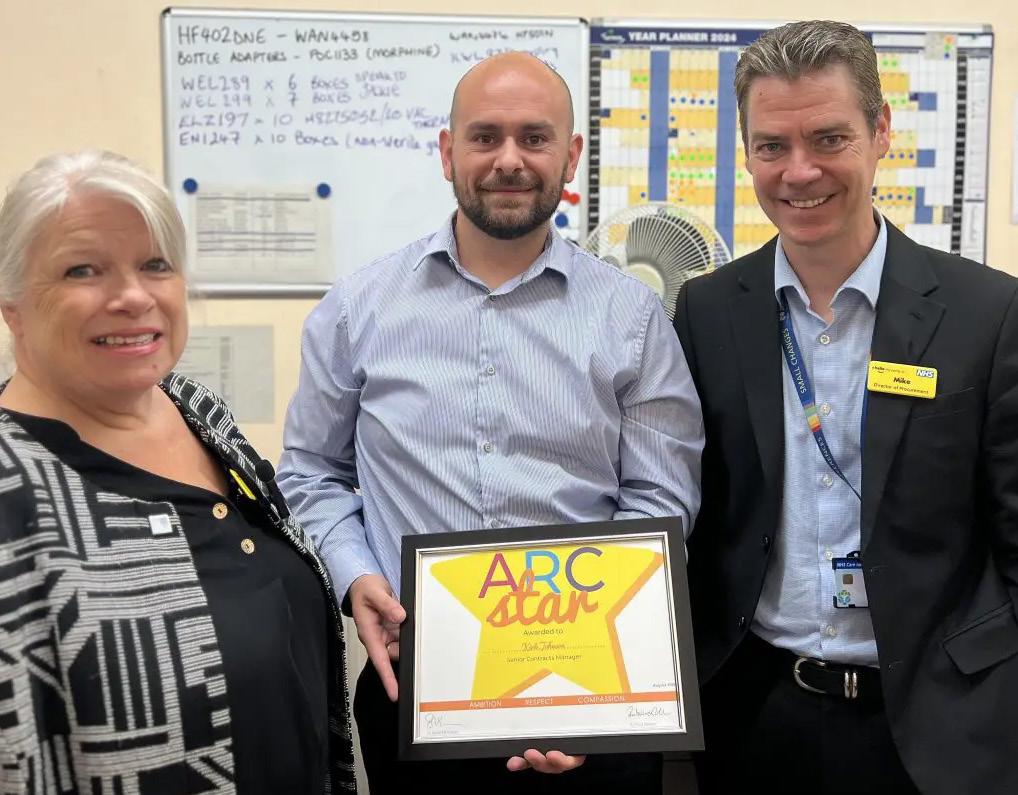
Shout out has been a regular feature in Heartbeat and it is fantastic to see colleagues regularly taking the time to give positive feedback to each other.
To nominate a colleague, visit https:// uk.surveymonkey.com/r/swb-shout-out and complete the short form
To – Sonia Williams
Sonia well done for making up booklets for the porters to help with locations of all of the departments and ward areas for the MMUH.
From – Tracy Banford
To – Clare Deaves
Clare has been instrumental in communicating and managing the recruitment of health visitors, admin, HCP's and converting our student HV's into substantive posts. This dedication has enabled us to continue to work as effectively as possible to despite the staffing challenges. A huge thank you Clare for going that extra mile, shortlisting on your days off and remaining on top of our recruitment.
From – Yvonne Copeland
To – Anand Arora
For helping out in theatre 5 during a difficult situation with a patient during the surgery. Dr Arora was very calm and reassuring and ensured the surgery was completed smoothly and safely. Theatre 5 team.
From – Beth Curley
Bahadur is the face of Clinical Effectiveness team for us in A&E. He is very proactive in reaching out to the team - to guide us, help us, encourage us to continue to undertake quality audits and QIPs - both local and national. He is very understanding and does everything he can to work with everyone. His communication is robust and a big thank you for his relentless contribution to quality of care and safety profile for the department and the trust.
To – Peter Jay
Thank you for all your hard work and preparations in making the Care Navigation Centre move to the Council House as seamless, stress-free and rapid as possible with no down time for our services. I would also like to thank you for ensuring that all the staff have adjusted well to the changes that came with such a drastic change, especially for staff who have been with the CNC from the very beginning at the Hallam Building. Thank you again!
From – Laura Stott
Hannah has been working tirelessly to get the whole team trained and familiar with omnicel, as well as organising group tours to MMUH. On top of her usual PDN role. We all can't express our huge appreciation for her!!
From – Kirstie Till
To – James Reynolds
Thank you so much for your help getting maps printed for Midland Met at very short notice. A lot of time was saved down to the help you gave me which is much appreciated.
From – Rosie Fuller
Kam is an asset to the wider LWBC team and always offers a helping hand, support and guidance. She is always first to offer valuable feedback which I really appreciate.
From – Beth Harvey
To – Natalie Tayler
Being a fantastic colleague and community midwife. Consistently goes the extra mile for her patients and always willing to support colleagues in need of advice or practical assistance. Thank you Natalie.
From
– Clementine Jack
To – Dawn Hall, Rob Kemp and team
Thank you so much for your teams hard work and cheery disposition during our move to Sandwell Council House. You made what could of been a very stressful time, go smoothly. We are now happy in our new home.
Thank you again.
From – Lucille Hedges

To – Kamaljit Bansal
Recently a well respected colleague left our service to take on a new role. A bring and share was arranged and Kam, made an absolute feast and attended our colleagues bring and share at Rowley, despite having to travel from Yew tree for this. Her contribution of food was amazing and she made sure that no one went home hungry! Thanks Kam from all of the team at Whiteheath
From – Rachel Langford
To – Volunteer Team
The Wayfinder volunteers are amazing in welcoming visitors, patients and staff into our hospitals. They are friendly and keen to help or assist where they can.
From – HoJan Senya
To – Analisa Reyes
She goes above and beyond to make sure patients get the best care. not forgetting her colleagues. she ensure she helps everyone when she can. we feel so blessed to work with her.
Sabrina and the team have been extremely helpful with making reasonable adjustments to a pt with a learning disability and her behaviours. Fantastic service!!!
From – Dawn Love
To – Clarissa Ronan
Clarissa has been instrumental in supporting the setting up of the Mainstream schools training packages that we deliver in Speech and Language Therapy. She has collated data from last year and enabled up to build on this knowledge to plan for this academic year. Clarissa has researched different booking systems and has set up all the courses using Eventbrite. I couldn't have done it without you Clarissa.
Thank you for your support and commitment. It is massively appreciated
From – Karen Hoar
After 30 years in NHS, Occupational Health Nurse Manager Clive Parbery will be retiring. Heartbeat caught up with Clive to get an insight into his last 11 years at the Trust and hear about his plans for the future.
Although he frequently worked alongside the team beforehand, Clive started officially working within Occupational Health (OH) here at the Trust in 2013. He shared: “When I first moved to OH, I was quite naive and believed that it would be fairly easy to reduce work-related hospital admissions. However, when I went to a foundry, I saw that the employees were exposed to all sorts of fumes and had to place their food and drink on edges where they would become ingrained with dust and other harmful particles. At this point, I realised that OH was so much more complex and important.”
“I started as a Specialist Nurse Practitioner and quickly became involved in all aspects of our department’s work both within the Trust and commercially” he explained.
“After 2020, our department structure changed, and I became the Clinical Service Manager. In this role, I became accountable for the whole team and was able to develop a close working relationship with our consultant and other OH departments around the region.
“When our Consultant left last year, I was afforded the opportunity to become Occupational Health Nurse Manager, where I developed my management skills and worked more closely with senior leads across the Trust, Health and Safety, Infection Control, HR and Medical staffing.”
Clive reflected on this role, highlighting: “It was very challenging, especially with some infection outbreaks and more pressure on the service, but it was a role which I thoroughly enjoyed and believe I excelled in.”
David Shakespeare, Deputy Director of Infection Prevention and Control (IPC) explained: “Occupational Health and Infection Control often work together, for example, when there is an outbreak of infection, with IPC addressing the patient and patient environment, and OH addressing the staff involved.”
“The hallmark of Clive has without doubt been his collaborative approach to solving any problem that arises, even when resources have been limited. He is a genuinely lovely guy, and all the team here at IPC wish him well for his retirement.”
Rebecca Loydon, Project Business Manager echoes these thoughts and said: I personally would like to thank Clive for working alongside me over the last two years as he
Occupational Health Nurse Manager
has offered me encouragement, guidance and invaluable support.
During Clive’s career here at the Trust, he faced many challenges, but one that was particularly prominent was the COVID pandemic. He explains: “My role was to support staff and managers alike with upto-date information, make them aware of any adjustments required, or just to lend a listening ear at what was a very stressful time. I like to think that the support I was able to give helped Trust employees get through these difficult times.”
When asked if there was a piece of advice that he would give to his younger self, Clive shares: “I would say follow your heart and don’t put your ambitions on hold. Go grab your dreams and make them a reality. Listen to others and always respect them. Life is one big learning opportunity, so make sure you enjoy it.”
Clive also shared his plans for retirement, explaining: “My immediate intentions are to do some travelling and spend more time with my family. I’d like to support my wife, who has set up a new charity for retired Greyhounds called ‘Home Run Hounds’. Having lost my father last year, I realise more than ever that you cannot get this time back.”
We wish Clive all the best in his retirement!
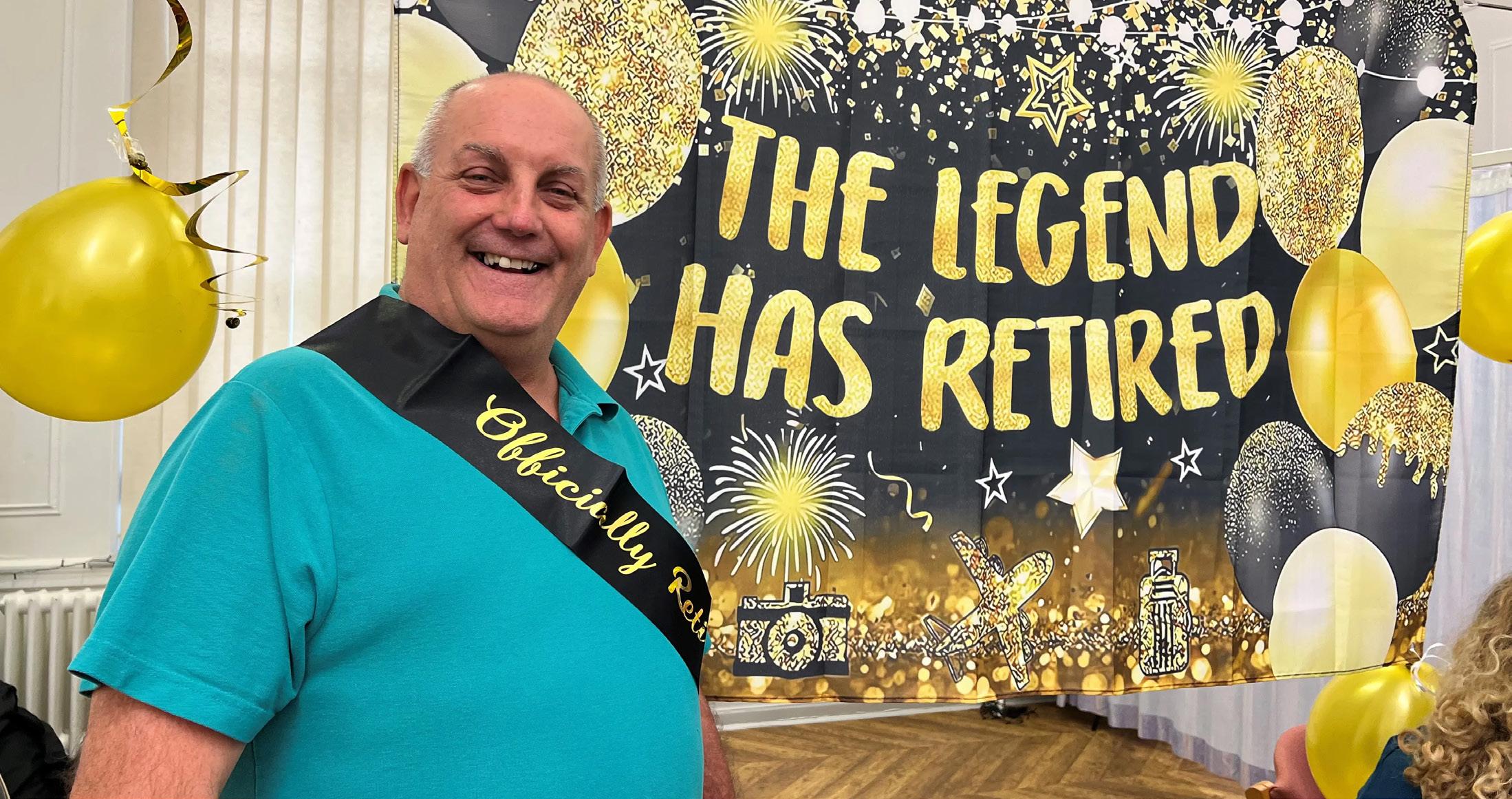
Richard Beeken, Chief Executive
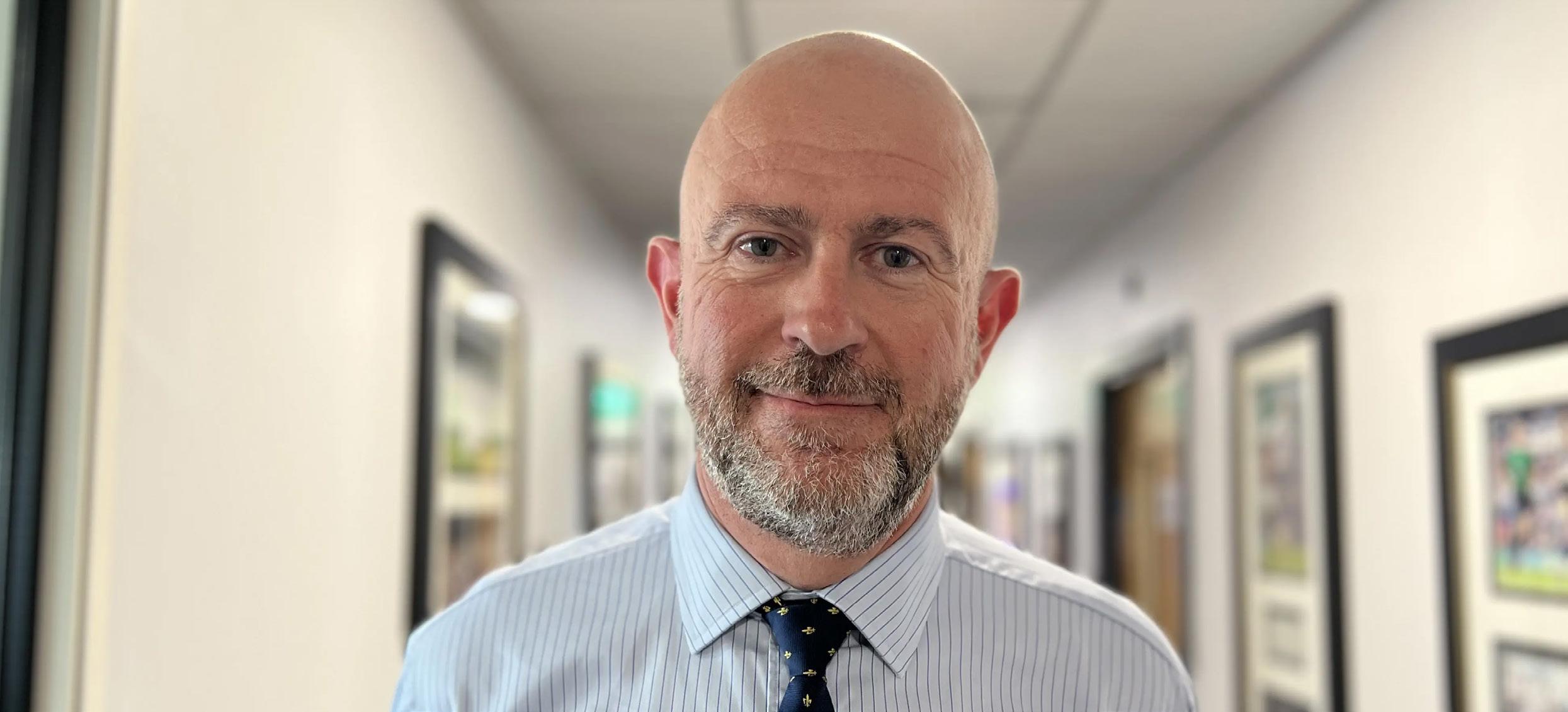
This will be my last Heartbeat column because as I’ve sadly now left the Trust after spending just under four years at the helm. It was an exceptionally difficult decision for me to make as this Trust does incredible things for the community it serves whist retaining that family feel that has made me feel welcome from the very first day I walked through the doors to Trust HQ at Sandwell. My executive team are hugely talented, and they have been a privilege to lead. Our Trust Board maintains the wider interests of our communities at heart, whilst overseeing cultural and leadership change which demonstrates a belief in the maxim that happy staff leads to happy patients.
I took considerable time over making this decision. In the end, I decided that having been Chief Executive at various NHS Trusts for nearly 11 years I feel the time is right for me to step away and embrace a new challenge, with a less intensive pace of working life.
When I first joined SWB I set myself three objectives.
The first was to stabilise the organisation, given it had, statistically, been harder hit by the impact of the COVID-19 pandemic, than any other Trust in the country. Secondly, I was keen to make the organisation start its journey to becoming more inclusive and compassionate in how people were led and managed and thirdly and rather obviously, Trust Chair Sir David Nicholson and I, were told in no uncertain terms, to ensure that our new hospital successfully opened.
On the first two objectives I think we
have made real progress stabilising the organisation and its leadership by starting to develop SWB’s ability to lead and manage people in a compassionate and inclusive way. There is clearly much more to do, but I am repeatedly told that the Trust feels like a more compassionate and inclusive place now and I am pleased to hear of that progress. We also see it in the significant progress we are now seeing in reducing our staff turnover and absence rates as well.
Regarding the third objective, MMUH, we delivered this successfully together and I couldn’t have done this without everyone’s hard work, professionalism and discretionary effort. Thank you all so much, for coming on that journey with me.
Now that we have opened our new hospital, there are some things I believe we need to do differently in the future. Using the Midland Met care model as the basis of that change, we need to invest more in our fantastic community services, improve patient safety and experience in urgent care, recover faster our previous reputation for excellence in elective waiting time performance and deliver the fundamentals of care better so that the CQC rating can improve and we can be better assured that we are providing services that we would want for our friends and family.
We’ve got further cultural change to make at the Trust, so we become one which others actively seek out to join and develop their careers. We must be an organisation whose workforce represents its local communities with all their diversity of background, faith and history.
We must now change our mindset – we have a new hospital, new care model and revitalised community services which are bucking national, more negative trends. We have invested in our values, our culture and our leadership. We have a unique approach to widening participation and developing opportunities for our local people. In short, we are a Trust which really is starting to deliver against its purpose – To improve the life chances and health outcomes of our population.
This Trust and more importantly the staff within it have been like a family to me from day one and I will not forget any of you who I have met and worked with on this incredible journey. I thank you all from the bottom of my heart for your support and kindness and helping SWB achieve such wonderful things over the last few years.
You now have a new Chief Executive, Diane Wake who started in January. I have known Diane for eight years and there are a few traits which she has, which I know will be well received by SWB colleagues and which serve us well. Diane is a nurse by trade – she has come up from the ranks, through roles as a ward sister, matron, Chief Operating Officer and Chief Executive. She is grounded in reality and realism and understands the needs of front-line teams. Diane has an incredible work ethic and a real attention to detail. She is performance focused and will not stop challenging the Trust to improve, until she believes the maximum of our potential is reached. I would like to ask you all to support her as she starts the unenviable task of leading two very different but remarkable organisations.